Walk Through The Wilderness
A Spiritual Pilgrimage Through lent
Devotionals from the Christian History Institute team

Front cover by Douglas Johnson based on Edward Lear (1812–1888), Olive Trees in the Garden of Gethsemane, 1858 (w/c on paper)—© Mead Art Museum / Bridgeman Images
Scripture quotations are copyright by the New Revised Standard Version (NRSV) and are drawn from the Revised Common Lectionary. Used by permission. The devotional for Friday in the first week of Lent is adapted from an article that originally appeared in Public Discourse, the online journal of the Witherspoon Institute of Princeton, NJ, https://www.thepublicdiscourse.com/, and appears with permission.
Copyright © 2023, Christian History Institute ISBN 978-1563649189
Christian History Institute PO Box 540 Worcester, PA 19490
introduction
What do you think of when you hear the word Lent? It may summon up ideas of giving up chocolate or other small indulgences, or of seeking to spend more time in prayer and Scripture reading in the weeks leading up to Easter. Perhaps images come to mind of people with crosses on their foreheads on Ash Wednesday, or of Jesus in the wilderness, or of the many dramatic events of Holy Week— leading ultimately to the moment when the Savior of the world died on a Calvary cross.
The word Lent comes from a German word meaning “lengthening,” referring to days growing longer in spring, when Lent traditionally occurs in the northern hemisphere. Lent developed out of periods of prayer and fasting by new converts in the early church in preparation for baptism; a form of the practice for everybody was a feature of Christian liturgy and spirituality by the fourth century.
Based on Christ’s 40 days in the wilderness as well as on other great biblical “forties” (40 days of rain on the ark, 40 days of fasting by Moses on Mount Sinai, 40 years in the wilderness), Lent is celebrated as 40 days beginning on
Ash Wednesday and ending on Holy Saturday (not counting Sundays, as each Sunday is meant to be a “little Easter”).
After the positive reception of our Advent devotional The Grand Miracle (a collaboration with the Wade Center), we here at CH conceived of the idea of publishing a similar booklet to accompany you on yearly journeys through Lent. This time we’ve drawn quotes from throughout church history, selected one for each weekday, and paired them with readings from the Scriptures on Sundays and holy days.
We’ve asked members of our Christian History Institute team to reflect on the quotes and the Scriptures. The devotional goes forward all the way through the Saturday after Easter Sunday—traditionally, Easter has been celebrated as a 50-day season, and, although we haven’t rounded out a full 50 days here, this additional week of prayer and reflection is meant to help us contemplate more fully the glory of the Resurrection.
We hope that journeying with these brothers and sisters in Christ from the past through Lent and into Easter will prepare your hearts and minds to follow Christ every day of the year. v
Jennifer Woodruff Tait
ash wednesday
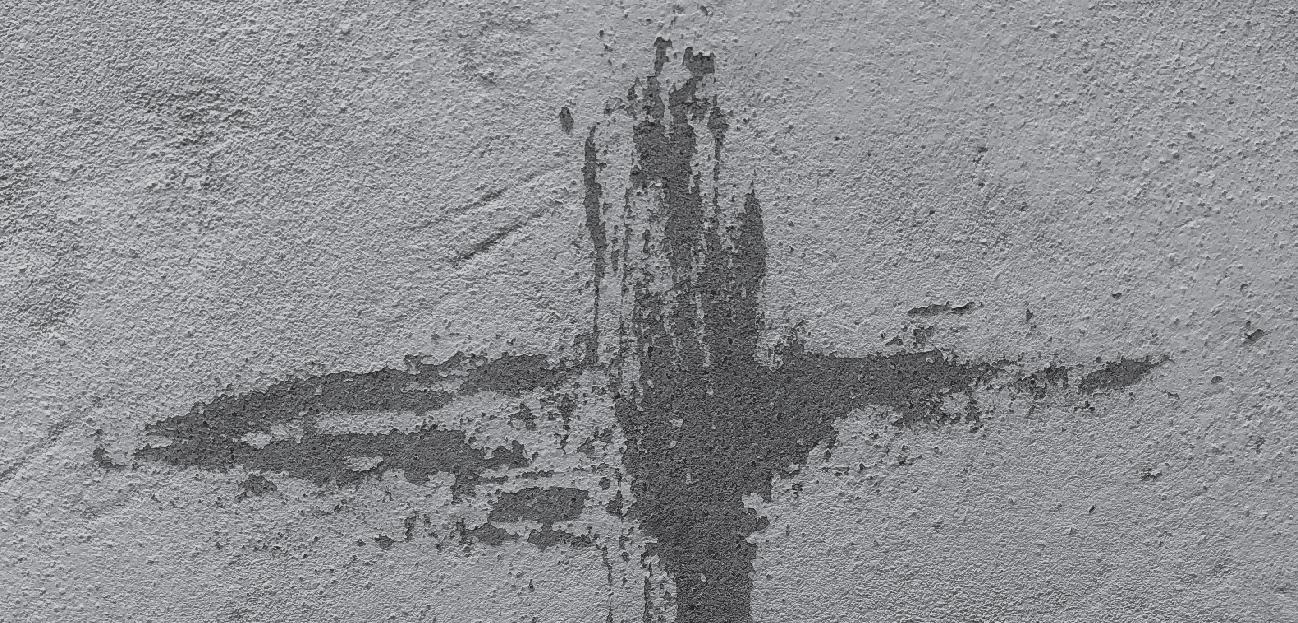
Yet even now, says the LORD, return to me with all your heart, with fasting, with weeping, and with mourning; rend your hearts and not your clothing. Return to the LORD, your God, for he is gracious and merciful, slow to anger, and abounding in steadfast love, and relents from punishing.
(Joel 2:12–13)
Donot store up for yourselves treasures on earth, where moth and rust consume and where thieves break in and steal; but store up for yourselves treasures in heaven, where neither moth nor rust consumes and where thieves do not break in and steal. For where your treasure is, there your heart will be also.
(Matthew 6:19–21)
Cross=Love— v aishakh pi LL ai on Unsp L ash
 Cross = Love, Vaishakh Pillai
Cross = Love, Vaishakh Pillai
Father! Thou hast patience long
With the sick and weak; Heal us, make us brave and strong, Words of comfort speak.
—Johann Georg Albinus (1624–1679); translated by Catherine Winkworth (1827–1878)
Thursday afTer ash wednesday
by Jennifer Woodruff Tait
Iremember well one of the first times I went to an Ash Wednesday service. The service was at noon on a university campus, right in the heart of the busiest part of the quad. Outside the sun was shining, buses went by, music escaped from passing cars, and students crowded the sidewalk. Inside it was dark and quiet and cool. The building, designed to resemble an old Gothic cathedral, was mostly stone, and my footsteps echoed. The cross on the altar was veiled in black. The service was contemplative, with sparse music, extensive Scripture, and a liturgy reaching back over hundreds of years, if not a thousand. When I went up front to receive ashes on my forehead, the pastor told me, “Remember that you are dust and to dust you will return.”
I came back out into the bright sunlight and made my way to the bus stop. As I climbed onto the bus, a girl turned to me and noticed the ashes in the shape
of a cross. “Is that some kind of sorority thing?” she asked.
The Ash Wednesday call to contemplate our own mortality and Christ’s sacrifice comes to us just so—in the midst of our daily life, in the midst of a world that looks on us with curiosity, even hostility. Lent is not an easy journey. Thus we need the help that Johann Georg Albinus prays for in this hymn.
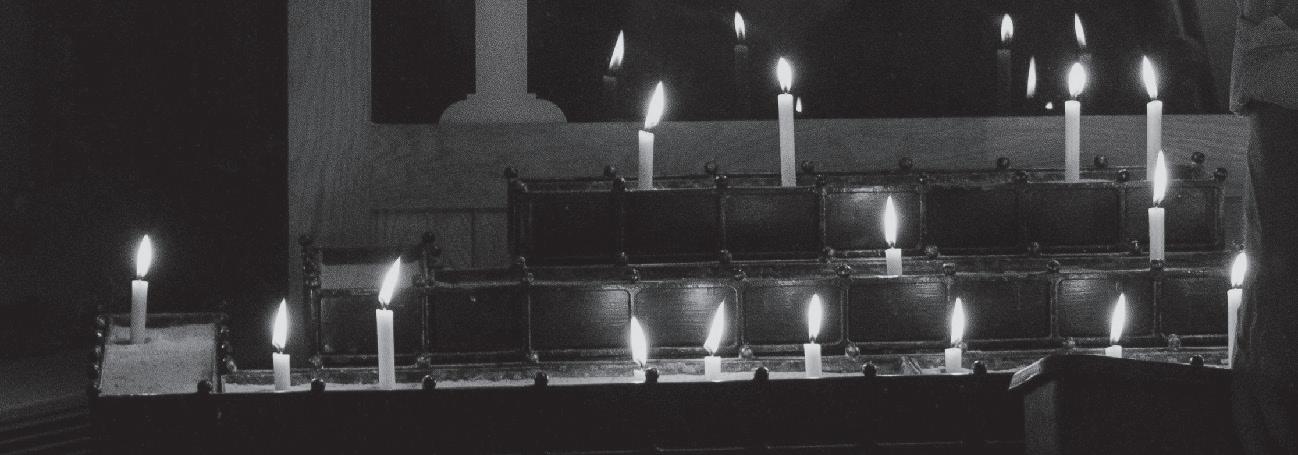
Albinus, known as a faithful and devout Lutheran pastor, wrote a number of hymns, some used by Johann Sebastian Bach in his choral works. When he died his son had inscribed on his tombstone: While he lived he was dying, and now when he is dead he lives, because he knew that life is the way of death and death is the entrance to life.
We will not make it very far on this journey without God’s help. Walk with him this Lent; seek healing and comfort from Jesus, where alone they can be found. v
v otive C
and L es, G L o UC estershire, U k a my m oore on U nsp L ash
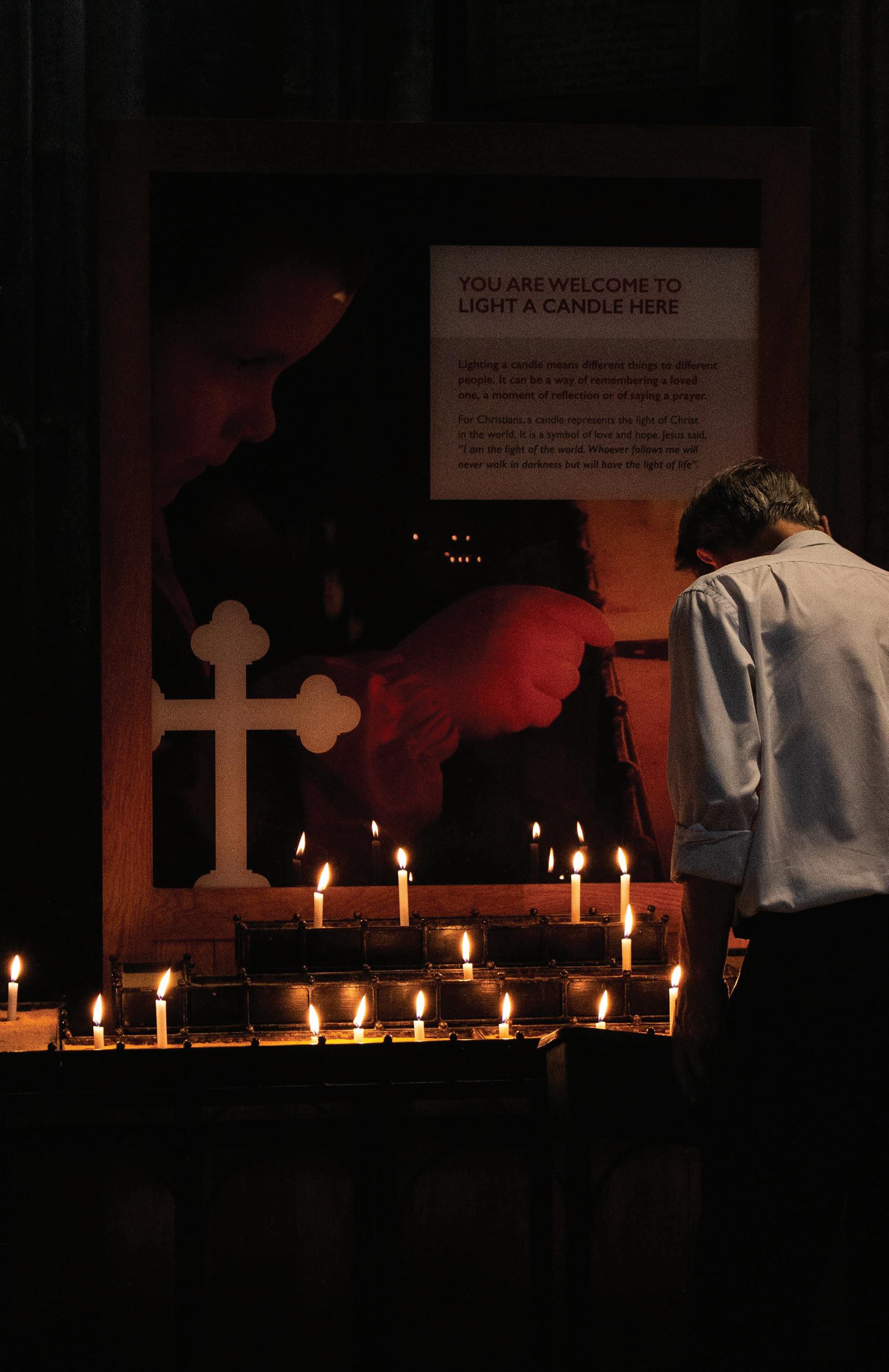 Votive candles, Gloucestershire, UK
Votive candles, Gloucestershire, UK
God’s servants have their spiritual fasts and their heads are metaphorically covered with ashes. I will not stop to read you the list of the occasions in which the princes of the royal blood of Heaven are found sitting in the place of humiliation and distress.
—Charles Spurgeon
(1834–1892), “Beauty
for Ashes”

afTer ash wednesday
by Kaylena Radcliff
My first experience with Ash Wednesday occurred in high school. I went to see The Passion of the Christ in the theater and found myself surrounded by people from presumably Catholic or high church Protestant traditions, smudges of black prominent on their foreheads. As a teen in an evangelical Protestant church—one that, as Spurgeon implies here, found “bodily exercises” too Catholic—it took me a moment to figure out why.
Still, as we fellow Christians sat in that theater, together experiencing a visceral representation of the humiliation and distress of our Lord, I could see the value of such visual reminders of our shared beliefs. Ash is a sorrow-
ful reminder of our mortality, our grief over our curse received with Adam’s sin; the dark stain marking us like Cain and separating us from intimacy with God. On the screen images flashed by that brought me to tears. Here was a picture of that same God bridging the chasm, taking on the humiliation of Adam’s frailty, suffering, and becoming a curse for us (Gal. 3:13).
As you begin the Lenten season, may the ash, however you see fit to conceive of it, bring to mind the sin that made Christ’s journey to Calvary necessary. But even as “sorrow has salted all our penitential tears,” remember the Lord promises to give “beauty for ashes” in the end. v
[ s
ti LL Life with Cr UC ifix]—GiniG e o_ p hoto G raphy, p ixabay
frIday
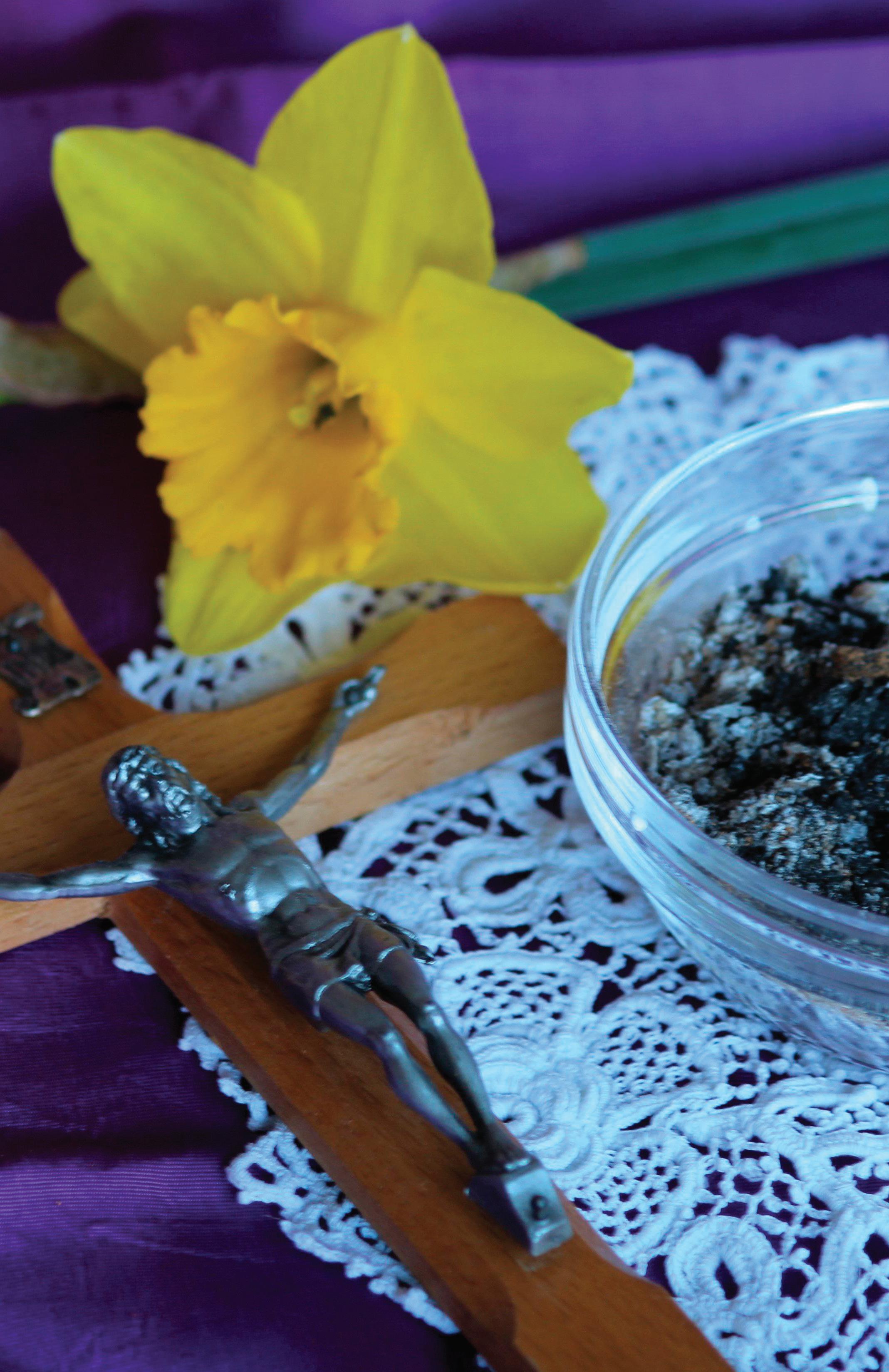 Still life with crucifix, Gini_Geo Photography
Still life with crucifix, Gini_Geo Photography
We read in the books both in the Old Law and in the New that the men who repented of their sins bestrewed themselves with ashes and clothed their bodies with sackcloth. Now . . . at the beginning of our Lent . . . we strew ashes upon our heads to signify that we ought to repent of our sins during the Lenten fast.
—Aelfric of Eynsham (c. 955–c.1010)
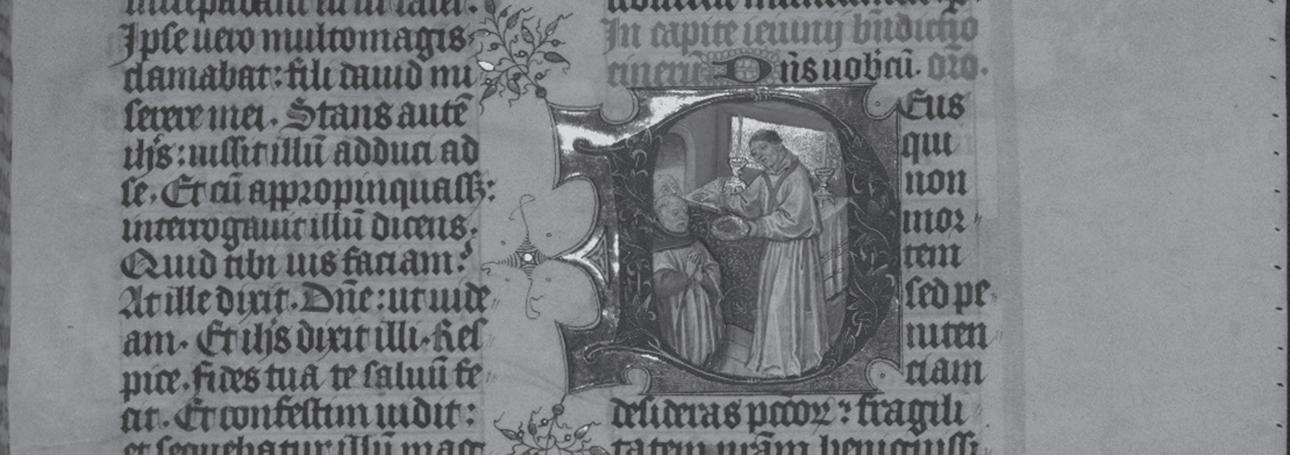
saTurday afTer ash wednesday
by Edwin Woodruff Tait
Historically, liturgical Christians take the position that liturgical practices are helpful ways of doing things that we all agree true believers will do anyway. We all know that believers pray: well, we have the Liturgy of the Hours to guide us in doing so. We know that we are to worship together: we have a liturgical calendar and traditions to guide us in doing so.
To me it seems clear that fasting— like prayer, common worship, the sacraments, works of mercy, and sexual chastity—is one of those basic elements of the Christian faith clearly ordained in Scripture. Jesus in Matthew 6 assumes that his followers will fast, just as they will pray and give alms. Mark 2:20 seems to say that Jesus’s followers will (and should) fast after his Ascension. Hopefully my liturgical fasting will further my own “spiritual journey,” but that isn’t really the main point. In fact
liturgical practices don’t really have to have a “point.” They are joyful expressions of faith—bodily ways of entering into the story of salvation. I trust that God will use them to my good and the good of others, but I don’t have to sit around checking my spiritual temperature all the time.
In fact every Lent I fail. Every Lent I draw up ambitious plans of spiritual improvement and fall flat on my face. I have never yet met a Lenten discipline I couldn’t manage to violate at some point. And in my experience, this is more common than not among Christians. Jesus’s disciples fell asleep as he watched in Gethsemane, and if we follow the estimable tradition of signing up to “watch with Jesus” on Holy Thursday, we will too.
But the only hope any of us has is that God doesn’t keep score.
And that is the point of Lent. v
Missal of Eb E rhard von Gr E iff E nklau , Ceremony of a sh w ednesday, w a L ters m an U s C ript w 174 , fo L 28 r detai L
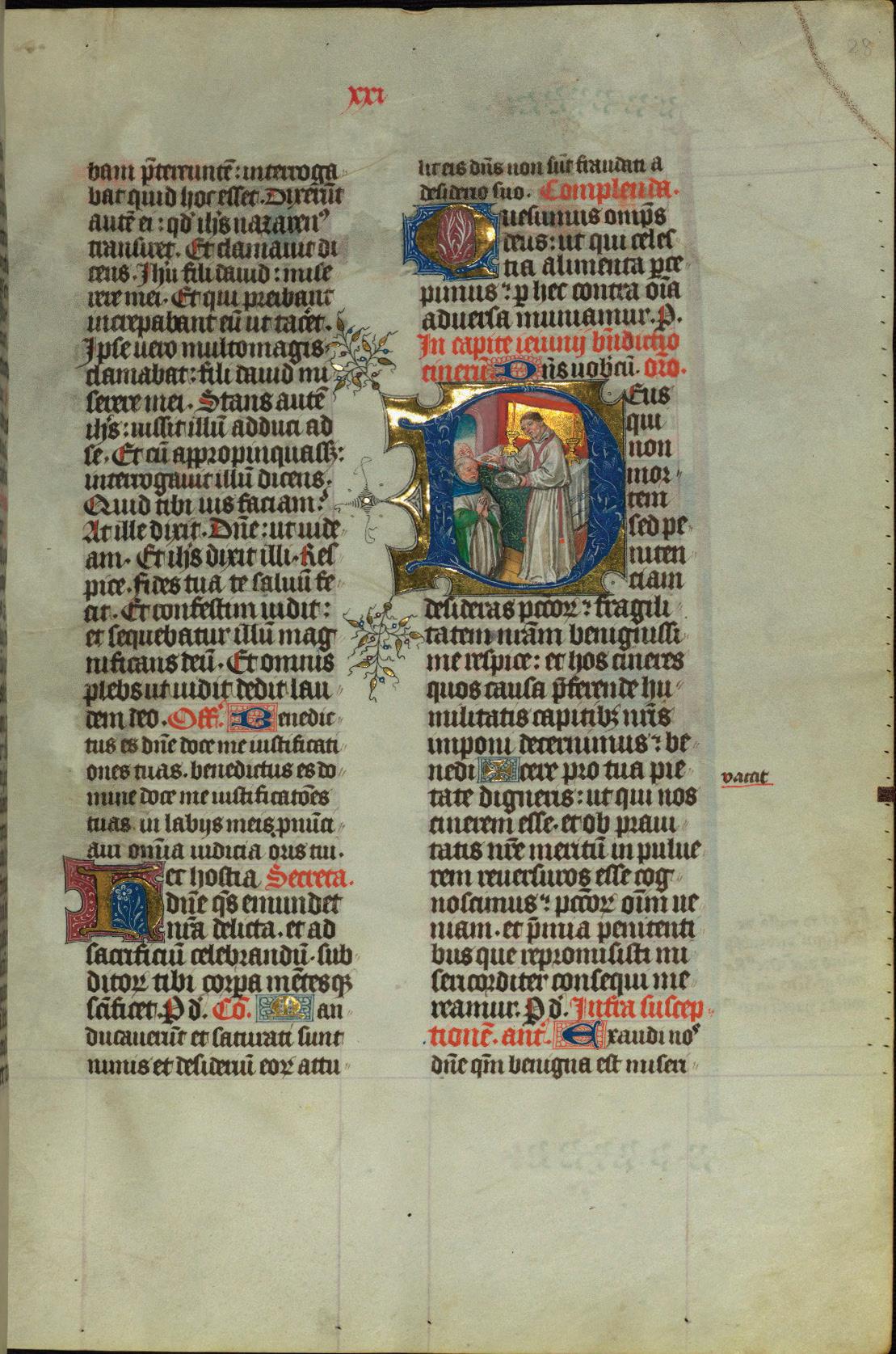 Ceremony of Ash Wednesday , Missal of Eberhard von Greiffenklau
Ceremony of Ash Wednesday , Missal of Eberhard von Greiffenklau
First sunday
The LORD brought us out of Egypt with a mighty hand and an outstretched arm, with a terrifying display of power, and with signs and wonders; and he brought us into this place and gave us this land, a land flowing with milk and honey.
(Deuteronomy 26:8–9)
The tempter came and said to him, “If you are the Son of God, command these stones to become loaves of bread.” But he answered, “It is written, ‘One does not live by bread alone, but by every word that comes from the mouth of God.’”
(Matthew 4:3–4)
Nowafter John was arrested, Jesus came to Galilee, proclaiming the good news of God, and saying, “The time is fulfilled, and the kingdom of God has come near; repent, and believe in the good news.”
(Mark 1:14–15)
 temptations of Christ (mosaic in basilica di s an m arco)— a nonymous / public domain, Wikimedia
temptations of Christ (mosaic in basilica di s an m arco)— a nonymous / public domain, Wikimedia
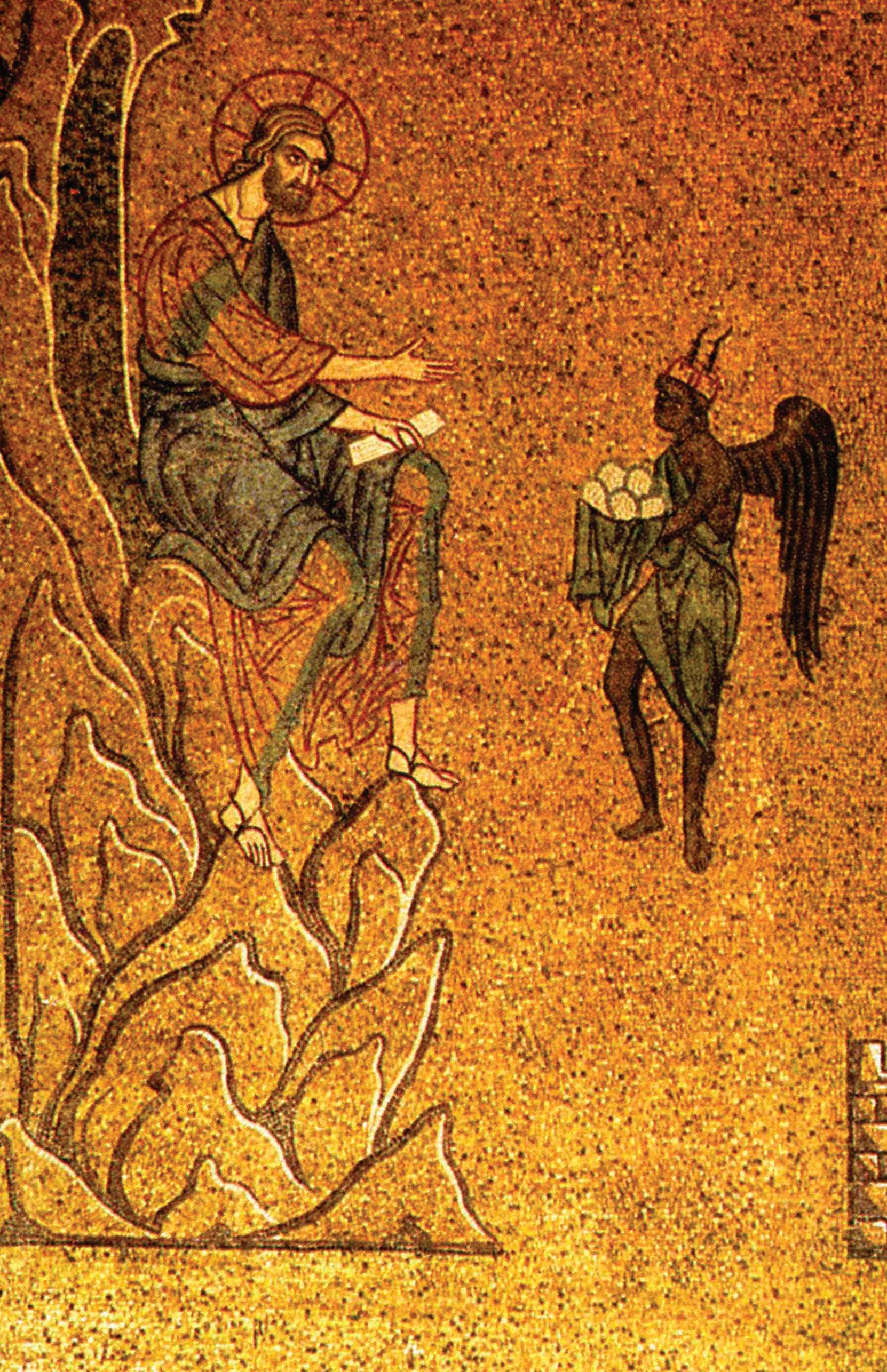 Temptation of Christ , twelfth-c. mosaic, St Mark’s Basilica, Venice, Italy
Temptation of Christ , twelfth-c. mosaic, St Mark’s Basilica, Venice, Italy
Dearly beloved, today you are invited to take a walk into the wilderness, to behold, sympathize with, and get instruction and comfort from a Savior tempted. In the conflict, he approves himself to be God’s beloved Son; and the Father gives demonstrable evidence, that with, and in him he is indeed well pleased.
—George Whitefield (1714–1770), “The Temptation of Christ”
monday, First week oF lent
by Michelle Curtis
Dearly beloved,” begins George Whitefield, “today you are invited to take a walk into the wilderness.” If this were an invitation to a backpacking trip in a beautiful mountain wilderness, I’d like to take him up on it. But instead Whitefield invites us to join Jesus in the wilderness of temptation. This is not the wilderness of stunning scenery that makes our heart delight in the awe of God’s creation. Rather, this is a barren wilderness; not the mountain-top highs of faith but the low ebbs of feeling alone, hungry, uncertain, and desperate.
We’re invited to join Jesus there. We’re invited to find comfort from Jesus there, when our soul is thirsty and we’re at the end of our rope. We’re invited to watch and see how Jesus stands up to temptation, reciting the Scripture that he has hidden in his
heart and feeding on God’s word rather than physical food.
As we journey into Lent, Jesus and his followers who’ve gone before us invite us on a journey that will not be fun or easy. But don’t be discouraged. Look at Jesus. With him recall your baptism. Can you hear God speaking over you, “You are my beloved daughter. You are my beloved son. With you I am well pleased”?
After 40 lonely days of fasting in the wilderness, I can only imagine that Jesus clung to those words with all his being. As you enter into Lent and walk into the wilderness, I invite you to cling to those words with Jesus. Whatever you encounter in the weeks to come, remember that you are God’s beloved child. v
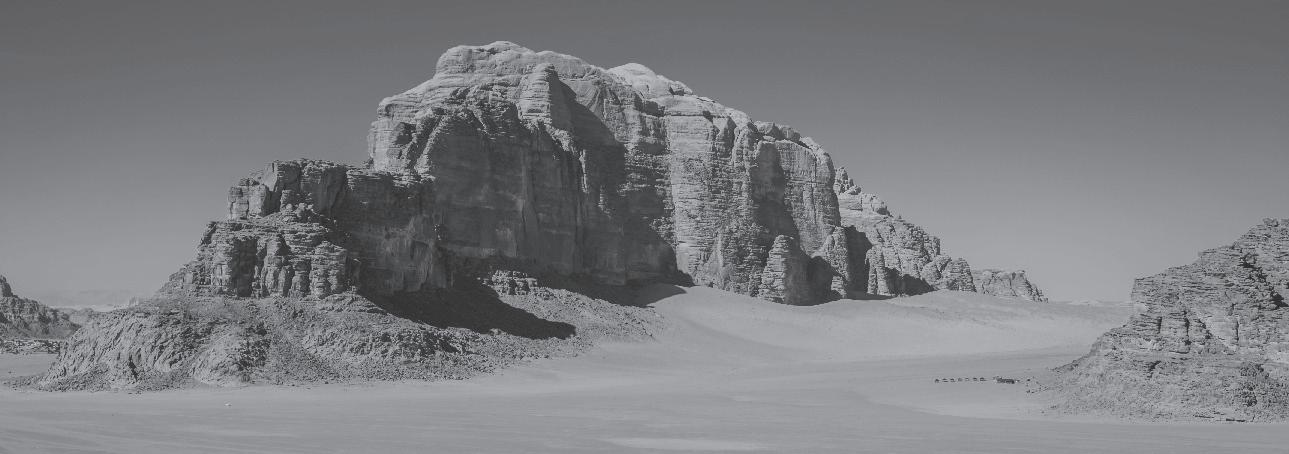
d esert p
u nsplash
hoto by r ita on
school of f ra a ngelico, Conversion s t. a ugustine ( 1430 to 1435 )— m usée t homas h enry / public domain, Wikimedia
Thus since we were weak, the Wisdom of God made Itself weak, when the Word was made flesh, and dwelt in us, that we might hope under His wings.
Augustine of Hippo (354–430), Exposition on the Book of Psalms
tuesday,
week oF lent by Chris R. Armstrong
First
Augustine led an unruly and intellectually prideful youth. The only things that kept him from complete self-destruction, he said in hindsight, were the prayers of his faithful Christian mother, Monica.
For nine years Augustine followed the Manichaean heresy, but then he came under the influence of a bishop named Ambrose, who showed him how Christian faith is intellectually respectable. Ambrose and several other Christian friends also pressed Augustine on his sinful lifestyle— especially his problem with lust.
The day of Augustine’s conversion began ordinarily enough. He was staying in a villa with Monica and his friend Alypius. A visitor dropped by—an officer of the imperial household called Pontitian, an African Christian. They sat down to talk, and Pontitian saw the epistles of Paul lying on the table. Delighted, he spoke of his own conversion, the monastic life, and the father of monasticism, Antony of Egypt.
Just hearing about such a man as Antony pierced Augustine to the heart. When Pontitian was gone, Augustine said to Alypius, “Simple men take heaven by violence, but we, heartless and learned—see how we wallow in flesh and blood! Are we ashamed to follow because others have gone before?”
Augustine left the house; Alypius followed him closely, perhaps afraid his friend would harm himself. In the garden Augustine heard a child’s voice chanting “Take up and read.” He opened the letters of Paul to a passage in Romans that challenged him to put aside his lustful habits and “put on the Lord Jesus Christ.” Stricken, his last resistance to the gospel at last stripped away, Augustine gave in and gave his life over to Christ.
Since we are weak, Augustine says, the Word of God meets us where we are. As with Augustine, when we are at our worst, God embraces us with his grace and will not let us go. v
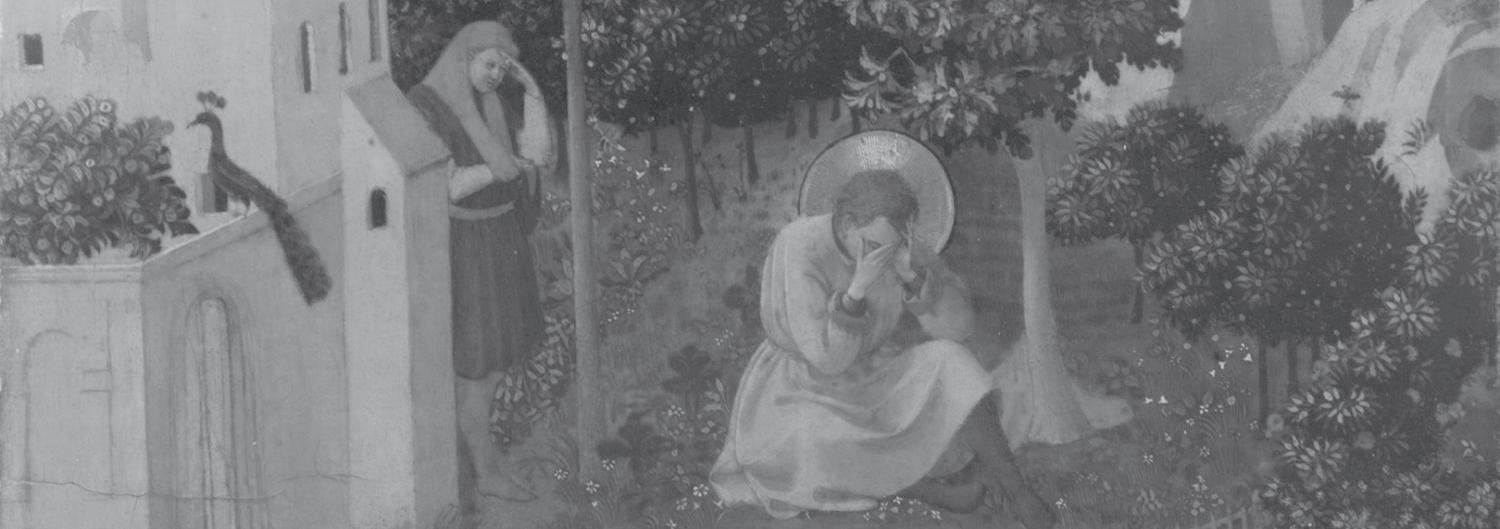
The Devil places us on high places by exalting [us] with pride, that he may dash us to the ground again.
Glossa Ordinaria (a 12th-c. collection of patristic and medieval biblical commentary)
w ednesday, First w eek oF lent
by Max Pointner
Imagine a social media post. The post itself is a verse of Scripture. The flowing comments beneath show dates hundreds of years apart, with surprising levels of careful, theologically grounded interpretation. Among the commenters are Augustine and Ambrose. If the best of these comments were edited and published in their own right, they would be exactly what the Glossa Ordinaria was in the Middle Ages. Published around 1150, it summarizes centuries of the interpretive marginal notes found in the Bibles of scholastics, saints, and scribes throughout Christendom; it became the standard textbook for how to interpret Scripture for generations. This particular quote is a gloss (interpretive comment) found beneath Matthew 4, in which the devil sets Jesus on the height of the temple and challenges him to jump off, empoying the angelic bodyguards mentioned in Psalm 91 to soften the impact. Jesus responds,
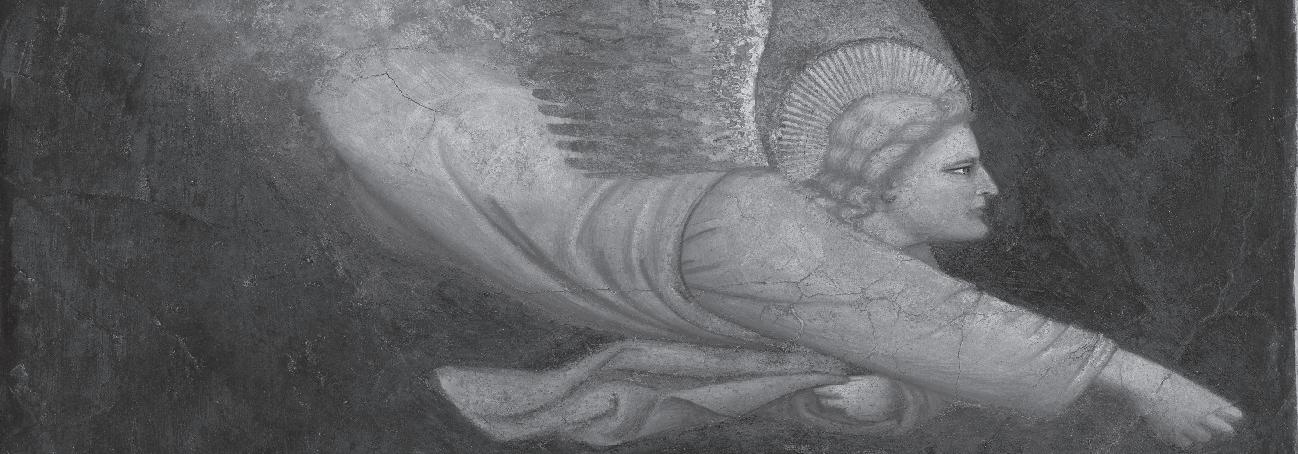
quoting Deuteronomy: “You shall not put the Lord your God to the test.”
Jesus needed no assurances from angels of his closeness with the Father, nor, as Paul put it, did he “count equality with God a thing to be grasped” (Phil. 2:6). Rather Jesus defeated the devil through his humble confidence in his Father’s love, even in the words of the Father spoken at his baptism right before being driven into the wilderness: “This is my beloved Son, with whom I am well pleased” (Matt. 3:17).
In our wildernesses, on the high, precarious places, God is close to us. This closeness is not something to bargain against our circumstances with, as if it gives us in ourselves some superhuman power. Rather it is the place to stand when all else is unsteady. We do not trust in God to get us out of sticky situations or seasons of darkness in this life; but we trust in the Father because, like Christ and through Christ, we know that his love is all we need for salvation. v
a nonymous, t wo a ngels m etropolitan m useum of a rt. b equest of e d W ard f o W les, 1971 . / [ cc 0 ] Wikimedia
Now, the temptation put before Christ was to seek the inheritance God has promised his children elsewhere than in God.
John

Calvin (1509–1564), Commentaries
thursday, First w eek oF lent
by Kaylena Radcliff
It was a problem I knew I had before the pandemic started, but it took a worldwide crisis to reveal I’d been seeking comfort in an unhealthy place: sugar. Sweets offered an easy fix, but in reality, they made me both physically and spiritually sick. Sugar, it turns out, can’t deliver on its promises. Maybe that scenario sounds familiar. Isn’t it just like us to seek out satisfaction everywhere other than in the One who can actually deliver it? When we feel empty, we fill it with food or entertainment or busyness instead of the life-giving words that come from our Father. When we are afraid or anxious, we first seek control over uncontrollable circumstances instead of seeking the promises we inherit in Christ. When we are weary, grieved, or burned out, we resist finding our rest in him.
The Bible tells us Jesus experienced some of these same emotions in the desert. He walked the desolate places; he was hungry, tired, and uncomfortable, both spiritually and physically. And that is when Satan whispered to him—at his weakest—as he so often does to us.
The difference is that Jesus, the perfect Son of God, remembered the inheritance the Father promised. He overcame the tempter in the wilderness, and ultimately he crushed Satan’s head at the empty tomb.
Today I encourage you to look to Jesus, “forgetting what lies behind and straining forward to what lies ahead” and pressing “on toward the goal for the prize of the upward call of God in Christ Jesus” (Phil. 3:13). Our inheritance in him is sweeter than honey (or sugar) and more precious than anything the tempter can promise. v
Western honey bee on a honeycomb— m atthe W t r ader / [ ccbysa 4.0 ] Wikimedia
Lord, who throughout these forty days
For us didst fast and pray, Teach us with Thee to mourn our sins, And close by Thee to stay.
—Claudia Hernaman (1838–1898), Child’s Book of Praise
Friday, First w eek oF lent
by Chris R. Armstrong
Both the story of Jesus’s tempting by Satan and the season of Lent evoke the traditional Christian practice of pilgrimage. Pilgrimages are spiritual journeys during which we leave behind comforts, incur costs, face difficulties, and endure disciplines. Christians undertake pilgrimages to encounter God in a more direct way.
In the story of Christ in the desert, we see him face Satan’s challenges. We see him wrestle with those challenges, marshaling his resources and his wisdom to fight his enemy. And his responses are consequential—they take him in one direction and not in another. Like Christ we Christians succeed not by fixing our sight on an abstract philosophy or a fixed law, but by clinging to our Father God.
As we face temptations along our pilgrimage, we turn to One who is stronger than we are. It is this exercise of personal trust, not merely giving cognitive
assent or living according to law, that constitutes our faith.
Lent magnifies this truth: we are designed to need and enjoy created goods, but we are also often tempted to love those goods inordinately and to sin in securing them for ourselves. To Satan’s “tell these stones to become bread” (the use of illegitimate means to satisfy our bodies’ legitimate needs), we are to respond by looking higher than those needs—to the very word of God. Jesus teaches us to trust that, as we seek first the kingdom of God and righteousness, those needs will be taken care of as well. This is one meaning of the Lenten practice of fasting.
If we make ourselves comfortable in our own little worlds, separated as they inevitably are from God, we end up walling ourselves off from the grander, if more difficult, experiences of pilgrimage. Ultimately we wall ourselves off from our real home with God in a renewed heaven and earth. v
e zra Winter ( 1886 –1949 ), Canterbury tales mural ( 1939 )— p hotographer c arol m h ighsmith; l ibrary of c ongress / public domain, Wikimedia;
o riginally published at https:// WWW .thepublicdiscourse.com/2019/03/49915/
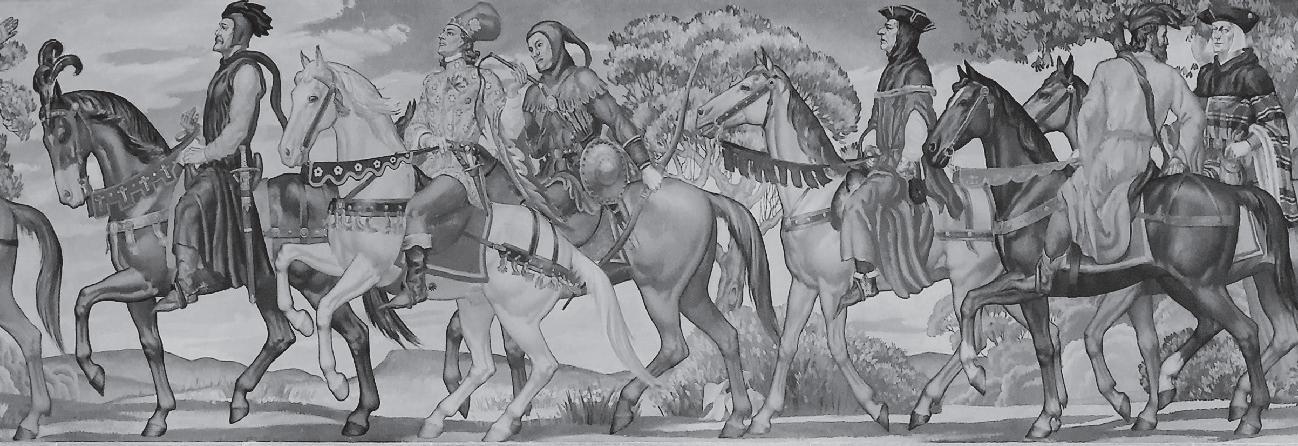
article
Jesus began to preach in Galilee, after . . . John was put in prison. If some be laid aside, others shall be raised up, to carry on the same work.
Matthew Henry (1662–1714), Concise Commentary on the Bible
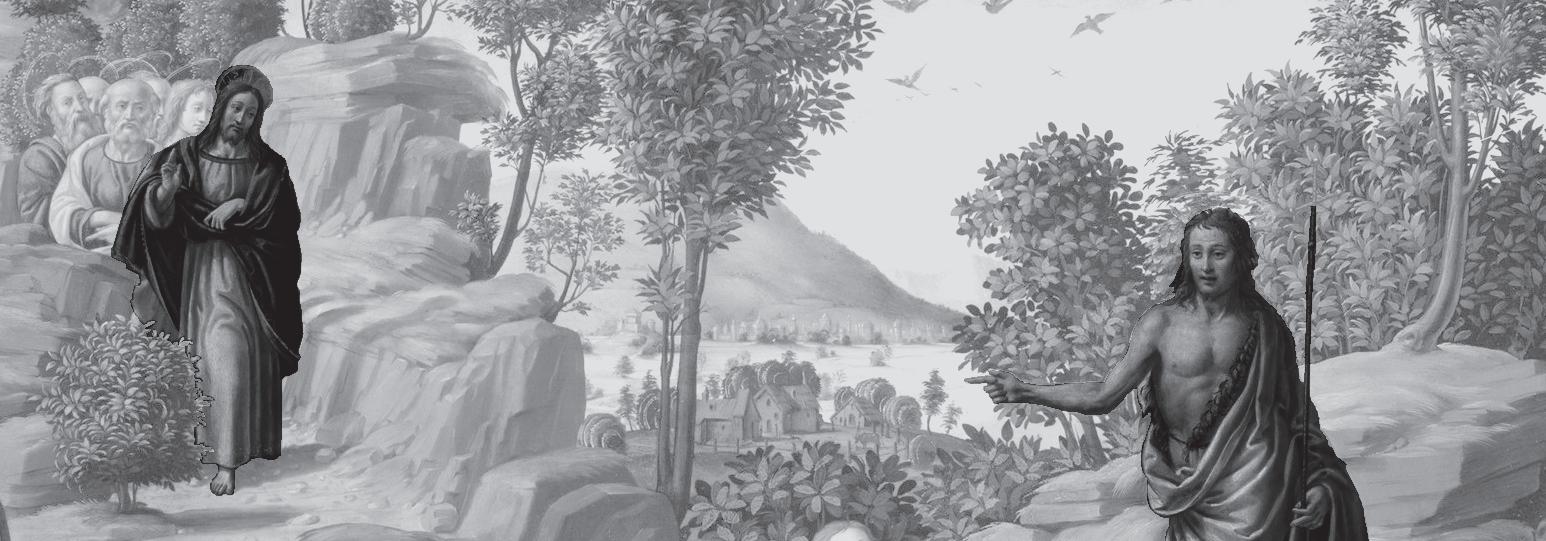 by Kellie Mitchell
by Kellie Mitchell
Igrew up hearing stories of missionaries from all around the world and throughout every time in history, from Phillip the disciple to those sent out by my own home church. As I reflected on this quote by Matthew Henry, I thought of many instances when someone was doing wonderful work for the Lord that had to be continued by another after they died.
For example Elizabeth Elliot continued ministry in Ecuador after her husband was murdered; Corrie Ten Boom taught women in her cell at Auschwitz about the Bible after her sister Betsy died. Why do people continue doing the work of another before them? Dr.
Esau McCaulley, professor of Bible and Theology at Wheaton College, answered my question so simply, yet so poignantly, “John the Baptist had his critique of those involved in structural oppression of the poor, and he offered particular actions of repair, but also made it clear that he was not the solution to their problem. One greater was on the horizon: the Messiah Jesus.”
In ministering to others, we have the opportunity to point to Jesus and reflect him to the world through our love for one another. When God’s people are doing his work, Jesus is always on the horizon. v
f rancesco g ranacci ( 1469 –1543 ), s aint John the b aptist b earing w itness m etropolitan m useum of a rt / [ cc 0 ] Wikimedia
saturday, First w eek oF lent
Second Sunday
And Abraham believed the LORD; and the LORD reckoned it to him as righteousness.
(Genesis 15:6)
For those who want to save their life will lose it, and those who lose their life for my sake, and for the sake of the gospel, will save it. For what will it profit them to gain the whole world and forfeit their life? Indeed, what can they give in return for their life?
(Mark 8:35–37)
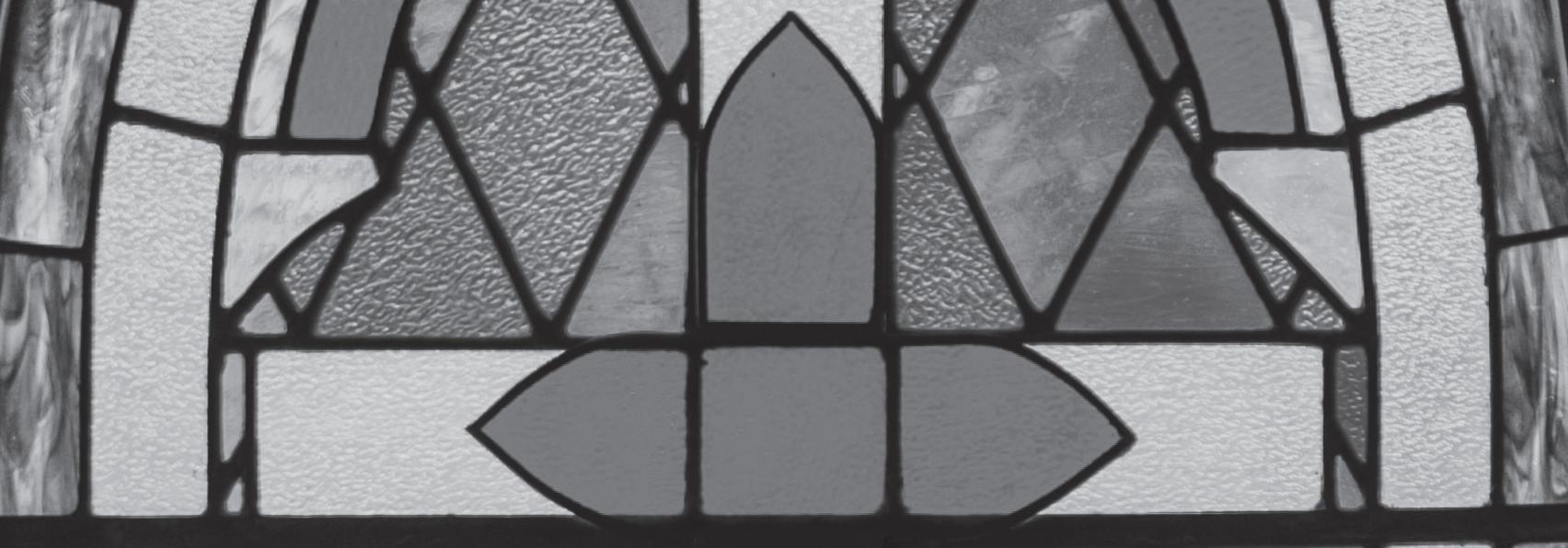
For God so loved the world that he gave his only Son, so that everyone who believes in him may not perish but may have eternal life. Indeed, God did not send the Son into the world to condemn the world, but in order that the world might be saved through him.
(John 3:16–17)
First Presbyterian Chur C h, Virginia City, n e V ada, s tained g lass Cross Windo W t im m ossholder on u ns P lash
 First Presbyterian Church, Virginia City, Nevada
First Presbyterian Church, Virginia City, Nevada
The world in which you move, the place of your living and loving and labour, not the church you go to on your holiday, is the place of divine service. Serve your neighbour, and you serve him.
—George MacDonald (1824–1905), “Righteousness,” Unspoken Sermons, Third Series
Monday, Second Week of lent
by Kaylena Radcliff
Iwear a number of hats. On Sunday morning I’m a pastor’s wife; on Monday morning I’m a homeschooling mother and magazine editor. Monday evening I’m the cook and, later, if I get everything else done, I’m an author.
Your hats are probably just as varied as mine. In the shuffle of constantly exchanging one hat for the other, it’s easy to forget that these roles we play are not the most important things about us. We are not only parent, employee, or even congregant or church member. We are, above all else, followers of the triune God: his worshipers, his heirs, his servants. And that does not end when we step out of
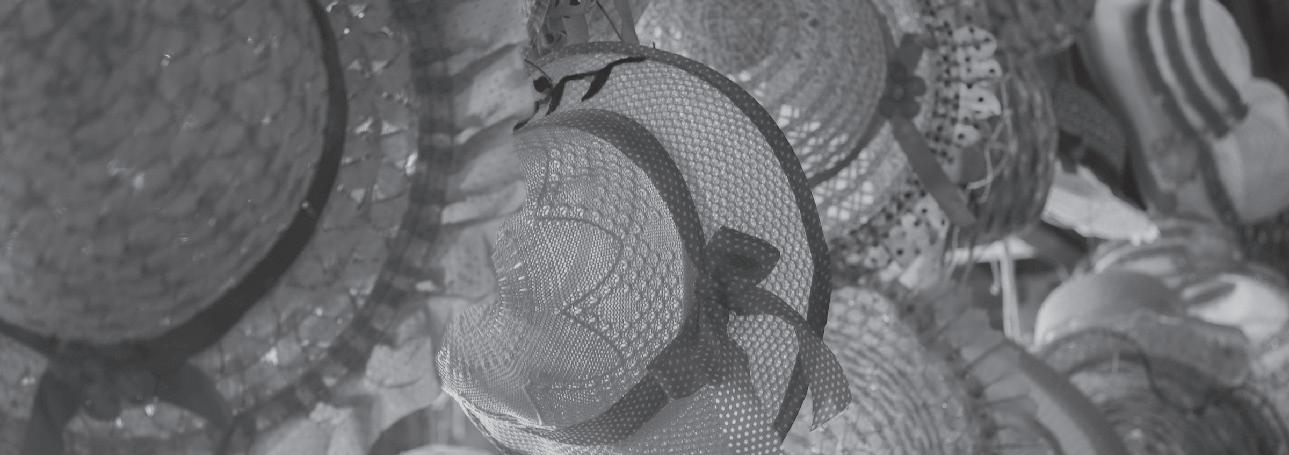
those church doors and take off our Sunday hats.
Indeed, as George MacDonald notes, we follow Christ in the spheres in which we operate each day. Do we tell the gospel with our lives and words? Do we serve and love our neighbor in our homes, in our errands, in our workplaces?
Remember, Christian: how you walk, how you love, and how you serve from Monday to Saturday is a reflection of who and how you truly worship. Yesterday God blessed you with a “holiday” in his presence. Even as you hang one hat on the hook and pick up another, allow that refreshment to equip you to divinely serve others today. v
[ h ats]—munish sa W ant
uns P lash. C om
on
The King of glory hath told thee, that he that will save his life shall lose it.
—John Bunyan (1628–1688), The Pilgrim’s Progress
tue Sday, Second Week of lent
by Bill Curtis
Who wants to lose their life?
Not most heathy people! Yet John Bunyan understood the teaching of Jesus well—that the only way to save our lives is to give them away. To die to self in service to Jesus is completely counterintuitive. Bunyan’s life is a remarkable example of dying to self. Bunyan spent decades in prison, at great cost to him personally and to his family, for preaching the gospel. All Bunyan had to do was agree to stop his “illegal” preaching and he could have gone home and been with his family. Bunyan chose instead to die to himself and to his desire for comfort and home, and to remain faithful to God’s call to preach the good news of Jesus.
During Bunyan’s years in prison, he wrote The Pilgrim’s Progress. It is an allegory that teaches about the spiritual journey and spiritual battles we all face.
Bunyan’s willingness to die to himself allowed him to receive The Pilgrim’s Progress as a direct gift from the Holy Spirit. It became the second best-selling book after the Bible. The Pilgrim’s Progress has helped millions of people understand we live the Christian life on a battleground, not a playground, with the enemy seeking to distract, confuse, and frustrate us in our efforts to live out our faith in Jesus—as my wife, Linda, reminds me. Though this concept of dying to self can be hard to wrap our minds around, I find Randy Kilgore’s advice helpful for making sense of Jesus’s teaching: “We glorify and enjoy God best when our thoughts, our actions, and our sacrifices are focused on Jesus, and not on how they make us feel about ourselves.” May you, like Bunyan, grow in focusing your thoughts, actions, and sacrifices on Jesus in this season of Lent. v
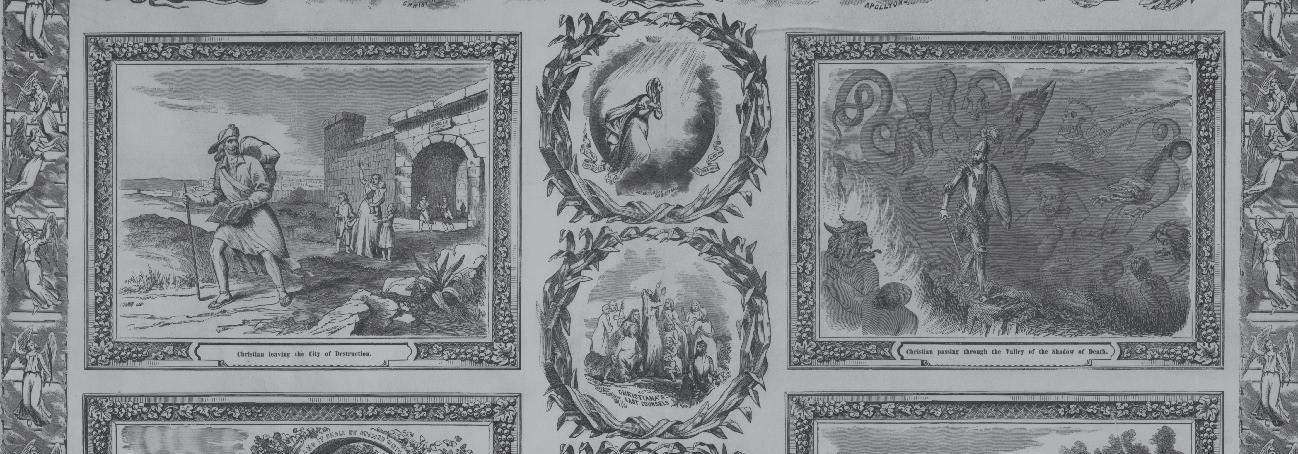
Pictorial Pilgrim’s Progress l ibrary o F Congress
Many lose the witness out of the heart by withholding their testimony from their friends and neighbors of the power of God to save. They run well for a season, but the tempter whispers “not now”—and by and by the soul becomes barren and unfruitful. May God help the young converts to “Watch,” and tell . . . what a dear Saviour they have found.
—Jarena Lee (1783–1864), Religious Experience and Journal of Mrs. Jarena Lee
Wedne Sday, Second Week of lent
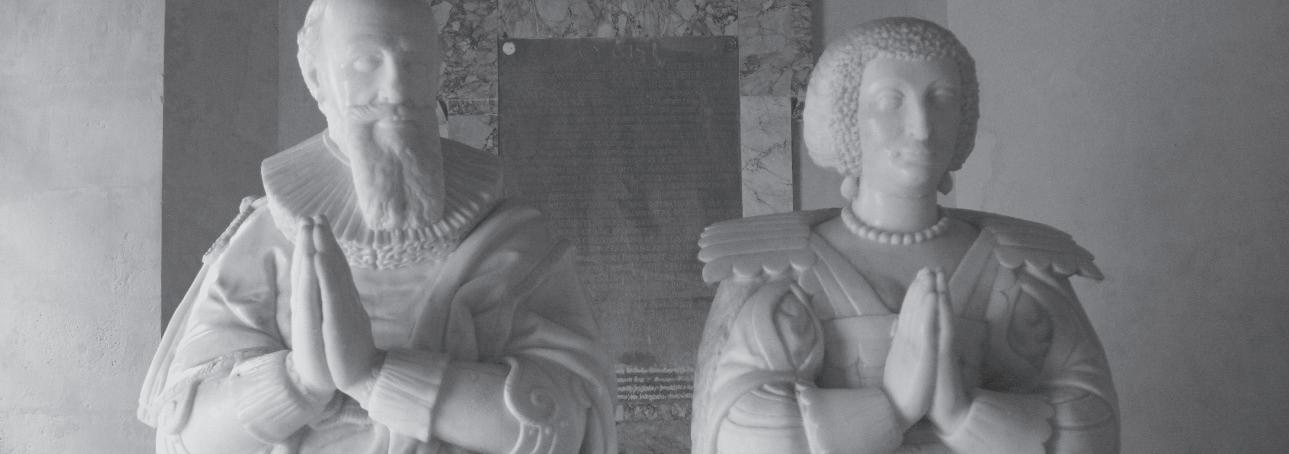 by Michelle Curtis
by Michelle Curtis
Do you find it easy to tell your friends and neighbors about God’s work in your life? I confess I often don’t. When I’m not actively in the habit of testifying to where I’m seeing God, Lee’s words can be true of me.
One season that I “ran well,” as Lee puts it, was during a three-year period when I was part of a weekly intercessory prayer group. It was a very small group, usually 3 to 5 and never larger than 10. We gathered once a week to pray for our community, for the world, and for each other. I found that group became a place where I practiced giving testimony week after week. My companions remembered what we had been praying for over the course of weeks and months, even when I sometimes forgot, and they helped me to look back and see how God was answering our prayers.
Recently one of my friends from that prayer group came as a guest preacher to the church where I am now a pastor. She shared with my congregation how the group had prayed for God to guide me for years—and rejoiced in how this congregation is God’s good answer to those many prayers. She reminded me yet again that God has indeed answered our prayers at a time when I was focused on the new requests of my here and now.
For me it takes good companions and the habit of praying and sharing about God’s work in our lives to keep up the good practice of testifying to God’s saving power and everyday faithfulness. What helps you to resist the tempter’s whisper of “not now” and to be bold in speaking about God’s power in your life? v
s tatues abo V e the tomb o F the d uke o F s ully, in n ogent-ler otrou, e ure-etl oir, Fran C e— b enjamin s mith / [CCbysa 3.0 ] Wikimedia
Learn hence, the exceeding preciousness of souls, and at what a high-rate God values them that he will give his Son, his only Son out of his bosom, as a ransom for them.
—John Flavel (1627–1691), Sermon 4 from The Fountain of Life thurSday,
Second Week of lent
by Kellie Mitchell
Jesus didn’t pronounce the prominent and powerful verse we know as John 3:16 in the famous Sermon on the Mount, or while teaching at a crowded synagogue, but spoke it to one man who sought him out one evening to ask questions. John 3 introduces us to a Pharisee and Jewish religious leader named Nicodemus.
Nicodemus always struck me as a serious thinker who never shut down his curiosity, but I used to read him as a minor character, easily forgotten in the bigger picture of Jesus’s ministry. The depiction of Nicodemus in The Chosen series completely changed my perspective on this story. He appears in the very first episode after he attempts to confront an evil spirit living in Mary Magdalene. The evil spirit’s power shocks
Nicodemus, and he cannot cast it out. He wrestles with that frightening experience, asking those around him in the rabbinical school what they know about such things; just when it seems he will never find answers, he hears about a man called Jesus.
I imagine Jesus and Nicodemus sitting with heads together outside of a restaurant or beside a fire. It is in this conversation that Jesus states one of the most quoted Bible verses of all time. Nicodemus was so precious to God that he offered him true life and hope through a personal conversation! This story serves as a beautiful reminder to turn to Jesus with my questions, doubts, and fears this season of Lent. How he blesses those who faithfully seek his face! v

[Fire P la C e]—Photo by g onzalo k a P lanski on u ns P lash
So strange, so boundless was the love That pitied dying men, The Father sent his equal Son
To give them life again.
—Isaac Watts (1674–1748), Hymn 103, Psalms and Hymns of Isaac Watts

friday, Second Week of lent
by Jennifer Woodruff Tait
Isaac Watts has always been one of my favorite hymn writers. His “O God, Our Help in Ages Past” was the processional hymn at Edwin’s and my wedding, and “Joy to the World” is one of the Christmas hymns I love the most (though, ironically, Watts wrote it about Jesus’s second coming.)
Watts was an English Congregational pastor and theologian responsible for many hymns that have enriched worship for generations: “When I Survey the Wondrous Cross,” “Come Ye That Love the Lord,” “My Shepherd Will Supply My Need,” and others worth meditating on.
This particular hymn was new to me, though, when CHI began work on this devotional; I was seeking quotes responding to John 3:16–17, one of the Scriptures for this week. John 3:16
is justifiably famous, but John 3:17 is if anything more meaningful to me: “Indeed, God did not send the Son into the world to condemn the world, but in order that the world might be saved through him.”
Of all Christian doctrines, the one that I struggle with the most is that God loves me. My own perfectionism and my sense of God’s awe and majesty make it hard for me to feel his love, though I believe the testimony of Scripture and the church that it is so.
John 3:17 speaks to my heart as it tells me that Christ does not condemn me, but seeks to give me life again; and Watts’s verses joyfully call me to approach a God who will love and forgive. That is a message it is always good for me to hear and at no better time than in this season. v
l ines F rom i
saa C Watt’s Psalms and Hymns
As we be punished here with sorrow and with penance, we shall be rewarded in heaven by the courteous love of our Lord God Almighty, who will that none who comes there lose his travail in any degree.
—Julian of Norwich (c. 1342–c. 1416), Showings
Saturday, Second Week of lent
by Edwin Woodruff Tait
In the flourishing late medieval town of Norwich, England, a small room known as an anchorite’s cell is built onto the parish church of St. Julian. A number of medieval churches had such cells. The anchorites living in them had vowed to spend their lives in solitude and prayer; but, living in the heart of the community, they became centers of pilgrimage and sources of spiritual advice.

The anchorite at St. Julian’s succeeded in obliterating her original identity so completely that we know her only as Julian of Norwich. Yet she was not only a famous spiritual advisor in her own day—people traveled miles to see her— but is counted among the greatest spiritual writers in Christian history.
Julian’s visions, like many others in the late Middle Ages, graphically portray Christ’s physical sufferings. But what makes Julian so remarkable is the vivid, radical way she draws out the implications of Jesus’s sacrificial love. At one point, tempted by a “friendly suggestion”
in her heart to look away from the cross in her vision, she responds by saying to the crucified Jesus, “You are my heaven.”
I first encountered Julian’s writings in a college class, and they have powerfully influenced me ever since. Her rich, imaginative, and profoundly orthodox presentation of the Christian faith compels me all the more because it is so thoroughly medieval, even while it radically transcends the flaws and limitations of much medieval popular piety.
When modern progressives tell me that God is all love, they are saying what their culture requires them to say if they are to be respectable believers at all. But when a medieval ascetic, shut up in a tiny cell attached to a stone church, has lurid visions of the discolored body of Christ on the cross and on the basis of those visions tells me that the self-giving, all-forgiving love of Jesus is the ultimate truth about the universe, then I dare to believe that it just might be true. v
s t. j ulian’s Chur C h, n or W i C h— a mit C hell125 / [CCbysa 4.0 ] Wikimedia
THIRD SunDay

Ho,everyone who thirsts, come to the waters; and you that have no money, come, buy and eat! Come, buy wine and milk without money and without price. . . . Seek the LORD while he may be found, call upon him while he is near.
(Isaiah 55:1, 6)
For Jews demand signs and Greeks desire wisdom, but we proclaim Christ crucified, a stumbling block to Jews and foolishness to Gentiles, but to those who are the called, both Jews and Greeks, Christ the power of God and the wisdom of God.
(1 Corinthians 1:22–24)
God is spirit, and those who worship him must worship in spirit and truth.
(John 4:24)
Blue Chur C h, Seyði S fjörður, iC eland—Photo B y Co S mi C t imetraveler on u n SP la S h
 Blue Church, Seyðisfjörður, Iceland
Blue Church, Seyðisfjörður, Iceland
Here [Isaiah 55] Christ offers to poor sinners, if they will come to him, to give them an interest in the same everlasting covenant that he had made with David, conveying to them the same sure mercies.
—Jonathan Edwards (1703–1758), A History of the Work of Redemption monDay, THIRD week of lenT
by Dan Graves
Ihave a great deal for all you who are underaged: a credit card attached to an inheritance. Read on for surprising details!
This card works differently than any other. The more you spend on credit now, while you are underage, the greater will be your inheritance when you come of age. You heard me right: Greater, not less! Interest does not accrue against you but for you.
That is how the Word-Backed, No-Limits, Heaven-Endorsed Rewards Card® works. Your eldest brother gave all he had to supply the credit line. He risked his life and his entire fortune, becoming poor so that you might become rich (2 Cor. 8:9), dying so you might live (2 Cor. 5:15; 1 Thess. 5:10).

The more you spend of your inheritance now—that is, the greater your willingness to trust his unlimited resources and provision—the greater will be your rewards. The long-established principle
behind this card is “As your faith, so be it to you” (Matt. 8:5).
Skeptical? Doubt no more! We have a host of testimonials and endorsements by users who found this credit line so trustworthy that they went so far as to allow themselves to be “tortured, not accepting their release” that they might increase their inheritance (Heb. 11:35).
Hungry? Thirsty? Try your card! The principle is simple: “You who have no money, come, buy and eat. Come buy wine and milk without money and without cost” (Isa. 55:1). “Ask and you will receive, seek and you will find, knock and it will be opened to you” (Matt. 7:7).
As a bonus this limited-time offer includes the Water of Life,® sought so futilely by Ponce de Leon and others. Your brother Christ held the secret all along and promised, “I will give freely to him who is thirsty from the spring of the water of life” (Rev. 21:6). v
C
C
redit
ard ada P ted from an i mage B y S j from Pixa B ay
Gaze often inwardly upon Jesus Christ crucified, naked, blasphemed, falsely accused, forsaken, overwhelmed with every possible grief and sorrow, and remember that none of your sufferings can ever be compared to His, either in kind or degree, and that you can never suffer anything for Him worthy to be weighed against what He has borne for you.
—Francis de Sales (1567–1622), Introduction to the Devout Life
Tue SDay, THIRD week of lenT
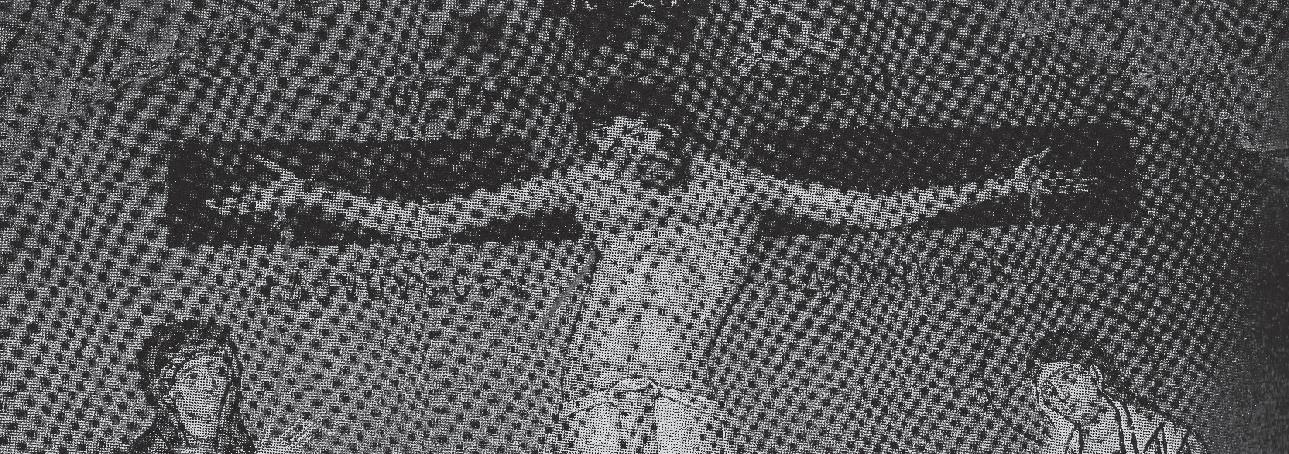 by Kaylena Radcliff
by Kaylena Radcliff
In my experience modern American Christians don’t have a robust theology of suffering. Many of us lead comfortable, peaceful lives, and instead of seeing that as the extraordinary blessing it is, we doubt God’s goodness when that comfort and peace are threatened or destroyed. In our hearts we ask: “If God is who he says he is, then why is this happening to me?”
Francis de Sales offends our modern sensibilities with this challenging reflection upon Jesus’s own suffering for us—not minimizing our pain and grief as part of a fallen world, but pointing to what Jesus rescued us from. Instead of leaving us to die in this tragic state for
all of eternity, God made him who had no sin to be sin for us, so that in him we might become the righteousness of God (2 Cor. 5:21). He did this at great cost, through incomprehensible suffering, and not even for good people who deserved it. He did it all, in love, for his enemies. For you. Whatever your “this” is today, however you suffer, you can rest assured that the Savior of your soul understands better than anyone its depth and significance. He walks through it with you, just as he went there before you. Lean on the One who has borne it all already. In love, for you. v
h o S io S l ouka S , Cru C ifixion of Jesus ( C . 1100)— m i C hal Bakni / P u B li C domain, Wikimedia
Begin with Christ. He came down to earth, lived among men, suffered, was crucified, and then He died, standing clearly before us, so that our hearts and eyes may fasten upon Him.
—Martin Luther (1483–1546), Commentary on Galatians
w eDne SDay, THIRD w eek of lenT
by Chris R. Armstrong
As a young monk, Luther struggled mightily with a sense of his own sinfulness and inability to please God. This struggle culminated in the revelation that triggered the Reformation: righteousness is not within our ability to achieve; God himself freely gives it. Surely such a truth would free a man like Luther from all spiritual darkness. And yet it did not. Again and again throughout his life he descended into severe spiritual anxiety and emotional struggle.
Luther’s years and decades of cyclical spiritual depression forced him to develop a theology of spiritual darkness. Despite the severity of Luther’s sufferings in these times of spiritual trial, he eventually came to see them as his monastic superior, Staupitz, had taught him: as “meat and drink” to strengthen his faith. This repeated testing from the devil himself both bruised
the conscience and drove it to God for consolation: “Therefore, we should willingly endure the hand of God in this and in all suffering. Do not be worried; indeed such a trial is the very best sign of God’s grace and love for man.”
We cannot trust our emotions, because they often lie. Rather we must trust the word of God, whose purpose for us is healing. And this act of faith is never more difficult nor as needed as in the throes of a spiritual dark night, when God seems a million miles away.
This unique understanding of God’s revelation is based ultimately upon the cross. During one prolonged crisis in 1527, so intense and agonizing that his friend Melanchthon felt Luther actually came near to death, the reformer composed “A Mighty Fortress Is Our God.” How many since his day have discovered in that single song a bulwark against darkness and doubt? v
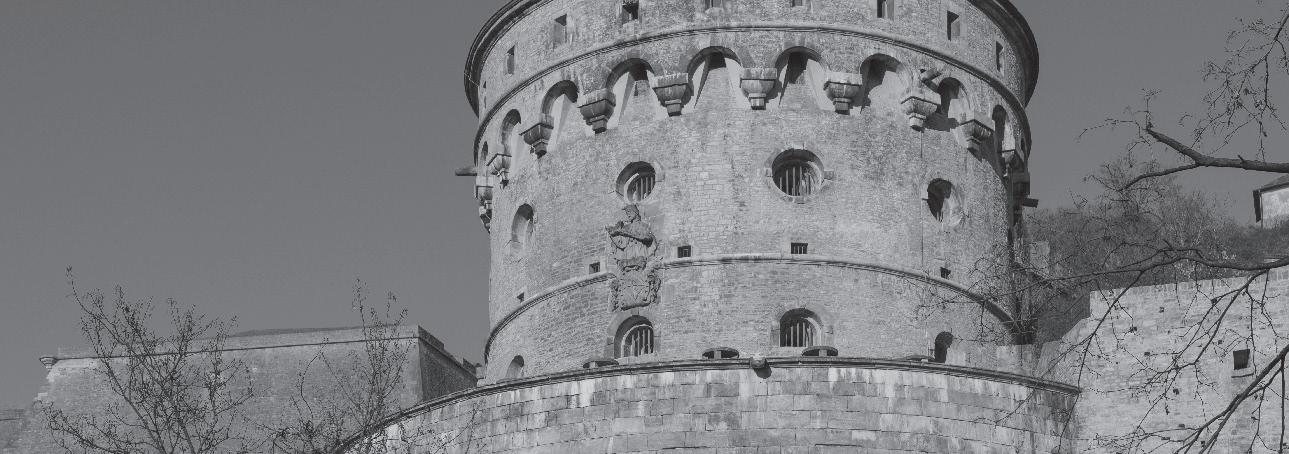
a S outh vie W of the m a SC hikuliturm, P art of f e S tung m arien B erg— dxr / [CC-B y -S a 4.0 ] Wikimedia
When I the blest Redeemer see All bleeding on the accursed tree; Satan and sin no more can move,
For I am all transformed to love.
John Newton (1725–1807), “Christ Crucified”
THuRSDay, THIRD w eek of lenT
by Kaylena Radcliff
What is the worst thing you’ve ever done?
It’s not a question anyone wants to answer in the best of circumstances; it is a nightmare to consider when one’s sins are great. And if anyone knew the pain of that question, it was John Newton. Before he became the famed abolitionist, preacher, and author of the beloved hymn “Amazing Grace,” Newton captained a slaving ship. For years he participated eagerly and remorselessly in human trafficking across the Atlantic. But after he came to saving faith and retired from his life on the sea, Newton fully comprehended the horror of his crimes.
He eventually confessed all in Thoughts Upon the African Slave Trade, which influenced public perception of slavery and helped lead to the abolition of the slave trade altogether. However, for Newton, the good he accomplished could never outweigh the evils he committed. He would have to wrestle with this for the rest of his life.
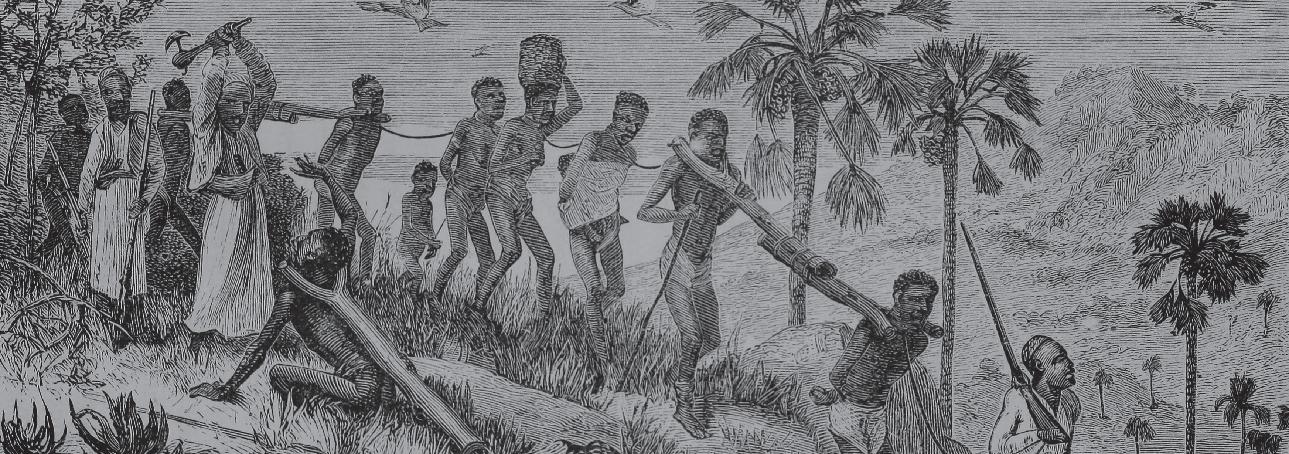
But instead of despair, Newton turned to the cross. There he found what he could not anywhere else in the universe: Grace. Freedom. Forgiveness. As he writes in another poem, “The Look”:
My conscience felt and owned the guilt And plunged me in despair
I saw my sins His blood had spilt And helped to nail Him there But with a second look He said “I freely all forgive This blood is for your ransom paid I died that you might live”
Like Newton we can lay our sins at the foot of the cross—even the worst things we have ever done. The blood of the Lamb shuts the mouth of the accuser, destroys the power of sin, and frees us from death forever. So final and powerful is our blest Redeemer’s triumph, that if we grasp hold of it, there is only one refrain: “I am all transformed to love.” v
“Slaver S revenging their lo SS e S ”— j . e . Cham B li SS , Life and Labors of d avid Livingstone . Philadel P hia: h u BB ard Brother S , 1875
We told him we had no place of worship; and we did not mean to go to St. George’s church any more, as we were so scandalously treated in the presence of all the congregation present; “and if you deny us your name, you cannot seal up the Scriptures from us, and deny us a name in heaven. We believe heaven is free for all who worship in spirit and truth.”
—Richard Allen (1760–1831), Life, Experience, and Gospel Labours
fRIDay, THIRD w eek of lenT
by Bill Curtis

About a year ago, my wife and I were coming out of the gym at our hotel, when I heard loud, joyful worship echoing from nearby. I went to investigate and found a church service taking place in a hotel conference room. After quick showers, my wife and I decided to join the service. It was a new Black church, and we were the only two Caucasians in the room. I was overwhelmed with the warm welcome and loving acts of kindness from this small church. I can’t remember ever being treated so hospitably in any other of the hundreds of churches I have visited. My experience was quite the opposite of the discrimination that Richard Allen faced back in 1794, which led him to form the first Black denomination in the United States, the African Methodist Episcopal Church.
As he fought for his congregation’s right to worship apart from the White church that was discriminating against his people, Allen quoted Jesus from
John 4:24, “God is spirit, and those who worship him must worship in spirit and truth.” He illustrated in his action that God doesn’t care whether we worship in a beautiful cathedral or a blacksmith’s shop (as he did) or a hotel conference room. God’s concern is that we worship in spirit and truth.
I am so thankful for the example of this little start-up church near Dallas, Texas, that worshiped with more “spirit” and enthusiasm than I am used to experiencing. Those worshipers reminded me that seeking God with our whole hearts is more important than any place or style or order of worship. That congregation also showed me the truth that no matter what the color of our skin, we can praise and worship the one true God together. Wherever you worship and no matter what challenges you face, remember the truth Allen expressed: “Heaven is free for all who worship in spirit and truth.” v
Herbert Hoover’s fat H er Jesse owned a b L a C ksmit H s H op —Chri S l ight / [CC-B y -S a 4.0 ] Wikimedia
Eternal Truth deigned to grant my fourth petition and to calm the anxious desire which prompted it: “Daughter, my providence will never be lacking to one who wishes it. There are those who have perfect hope in me. They call on me in truth, not merely with their lips but with true attachment and with the light of holy faith.”
—Catherine of Siena (1347–1380), letter to Friar Raymond of Capua
SaTuRDay, THIRD w eek of lenT
by Dawn Moore
Over the last 18 months, I’ve developed a deep friendship with a saint who is further along in years. I’m continually amazed at the many ways she selflessly pours love into friends and family members going through crises. Her faith, wisdom, and energy are astounding to me! Yet when I was personally going through a serious trial, she wrote, “I am praying for you with the little bit of faith that I have.”
Just a “little bit of faith.” Though I’ve forgotten the specific need that prompted them, her words and humility still encourage me. So often I feel my faith is on shifting sand, but maybe a lit-
tle bit is just enough, especially if I can accept a drop of faith as the gift that it is.
Too often we view heroes and saints of Christian history as having unflinching faith—their courageous acts and words that still inspire would suggest as much. Yet this quote from Catherine of Siena speaks of a fourth petition and an anxious desire. Could she have had some doubts of her own?
Like Catherine let us take comfort in the Lord’s response: “My providence will never be lacking to one who wishes it.” When faith feels like a small drop in a vast ocean, may it be grounded in truth and aglow with holy light. v

k avourotry P e S B ea C h— a na S ta S ia t aioglou on u n SP la S h
Fourth Sunday
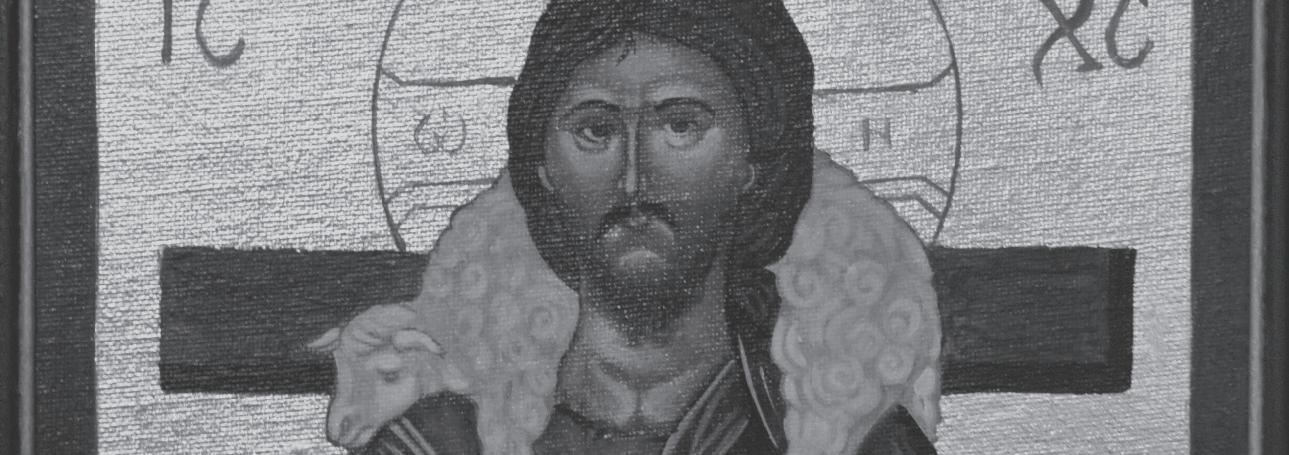
The LORD is my shepherd; I shall not want.
(Psalm 23:1)
For by grace you have been saved through faith, and this is not your own doing; it is the gift of God—not the result of works, so that no one may boast.
(Ephesians 2:8–9)
We had to celebrate and rejoice, because this brother of yours was dead and has come to life; he was lost and has been found.
(Luke 15:32)
Icon: Christ the Good s hepherd —Daryl c ( I ncarcerate D art I st), 2011
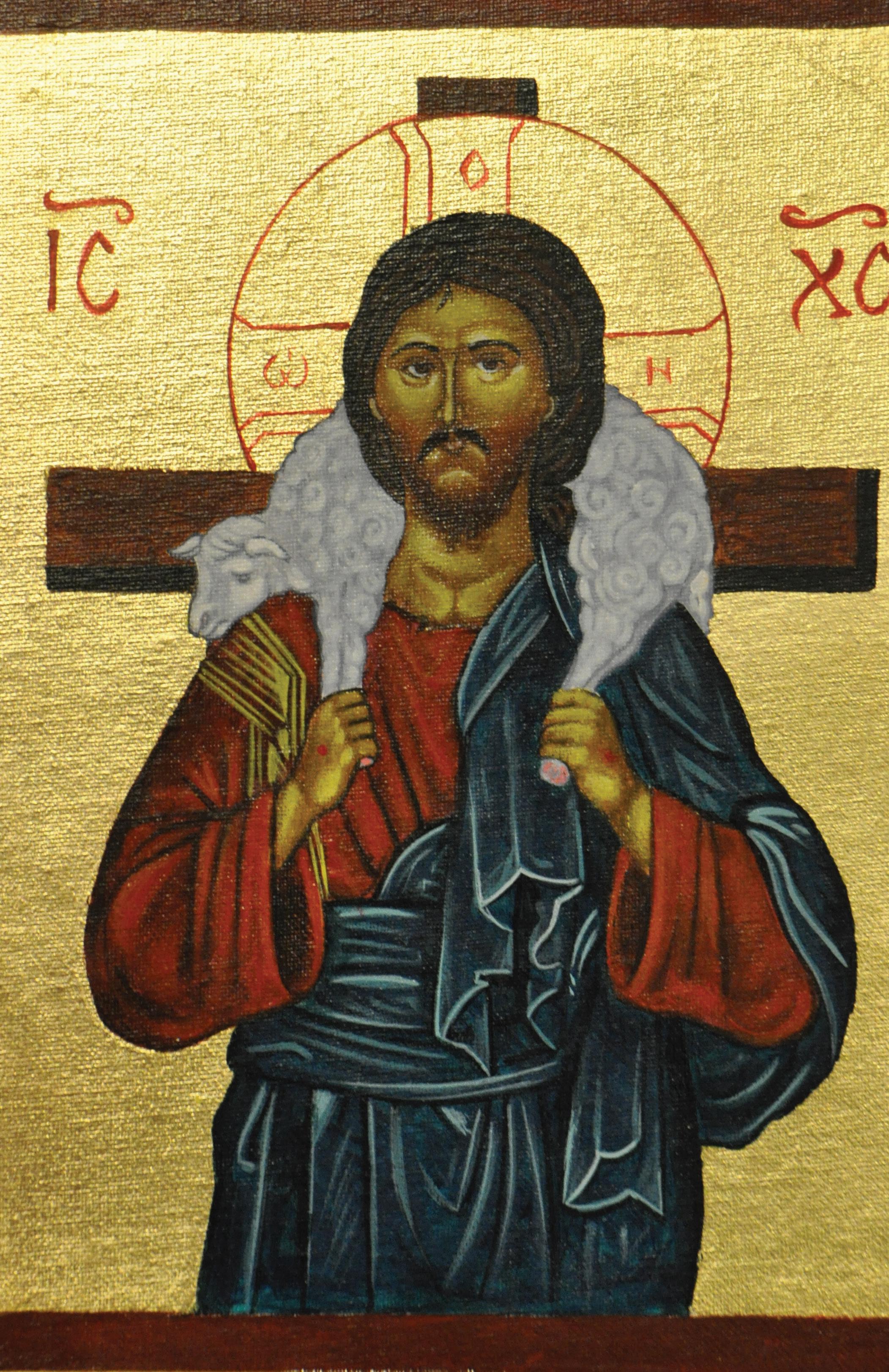 Christ the Good Shepherd, Daryl C (incarcerated artist), 2011
Christ the Good Shepherd, Daryl C (incarcerated artist), 2011
Loving Shepherd of your sheep, all your lambs in safety keep; nothing can your power withstand, none can pluck them from your hand.
—Jane Eliza Leeson (1808–1881), “My Sheep Hear My Voice”
monday, Fourth week oF lent
by Kaylena Radcliff
Nothing in my life thus far has prepared me for the anxieties of parenthood. While each new stage has its joys, it also comes with a new set of worries—as, for example, when I dropped my daughter off at overnight camp for the first time this past summer. Panic enveloped me as we neared the camp. Will she be safe? Will she miss us too much? Will she make friends? Will she be okay?
Even when the kids are home, I often find myself double-checking beds in the wee hours of the night, crippled with fear over their well-being. In those times, when I lie awake and trembling, the Spirit faithfully guides me to the words of Psalm 23.
Believers throughout the ages and the world have long sought the comfort found in this psalm and for good reason. What a balm it is to the soul to know God loves us and the people whom we love far more than we can comprehend! What peace there is in his power, to know he sustains, protects, and even blesses us in the presence of enemies. How he answers when we call out in our terror and fragility: “Behold, I am with you always, to the end of the age.”
The next time that anxiety rushes over you like a wave, seek the still waters of Psalm 23 in the arms of your loving shepherd, who restores your fearful soul. Take heart, little sheep! Nothing can pluck you from his hand. v
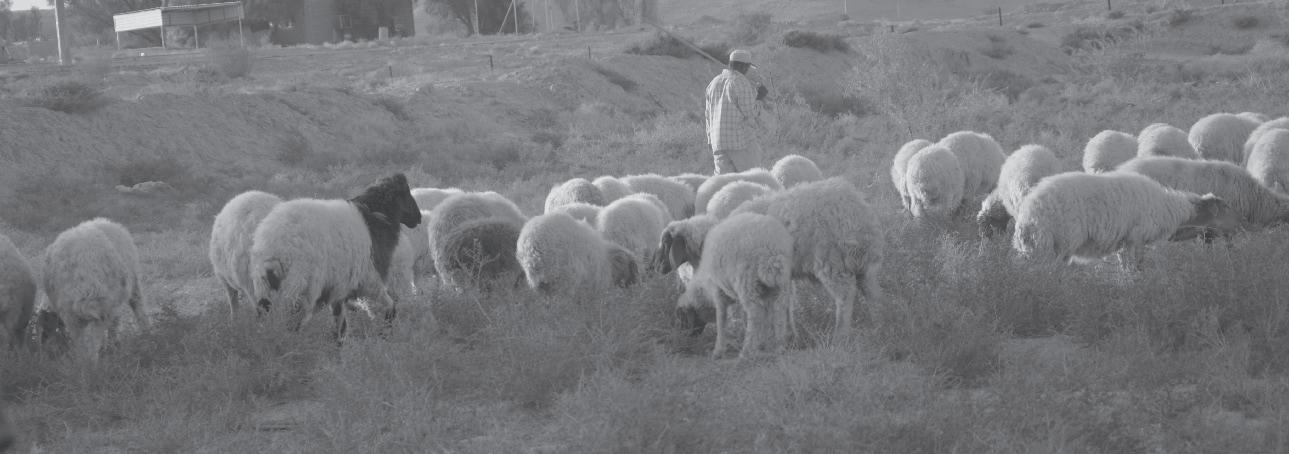
s hepher D an D sheep I n s au DI a rab I
I
/ [
-
] W I k I
a
a—ha
tham alfalah
cc
b ysa 3.0
me DI
I went very unwillingly to a society . . . where one was reading Luther’s Preface to the Epistle to the Romans. . . . While he was describing the change which God works in the heart through faith in Christ, I felt my heart strangely warmed. I felt I did trust in Christ, Christ alone, for salvation; and an assurance was given me that He had taken away my sins, even mine, and saved me from the law of sin and death.
—John Wesley (1703–1791), Journal
tue Sday, Fourth week oF lent
by Jennifer Woodruff
Tait
On Always Being Somewhere Relative to the Cross: Or How to Have a 13-Year-Long Instantaneous Conversion (Dedicated to the memory of John Wesley)
Almost a Christian,” almost persuaded, Knowing, despairing, the one thing needed, Lost in the shambles of works collapsing, Never quite trusting, but always asking: What can I do that will make me holy? Where can I go to find him fully? Curses with blessing, grasping and falling, Caught in a net, still drawing, pulling, Nothing but rags of myself to trust in, Nothing to answer the haunting question, Turned upside down and going under— Until the skies were rent asunder.
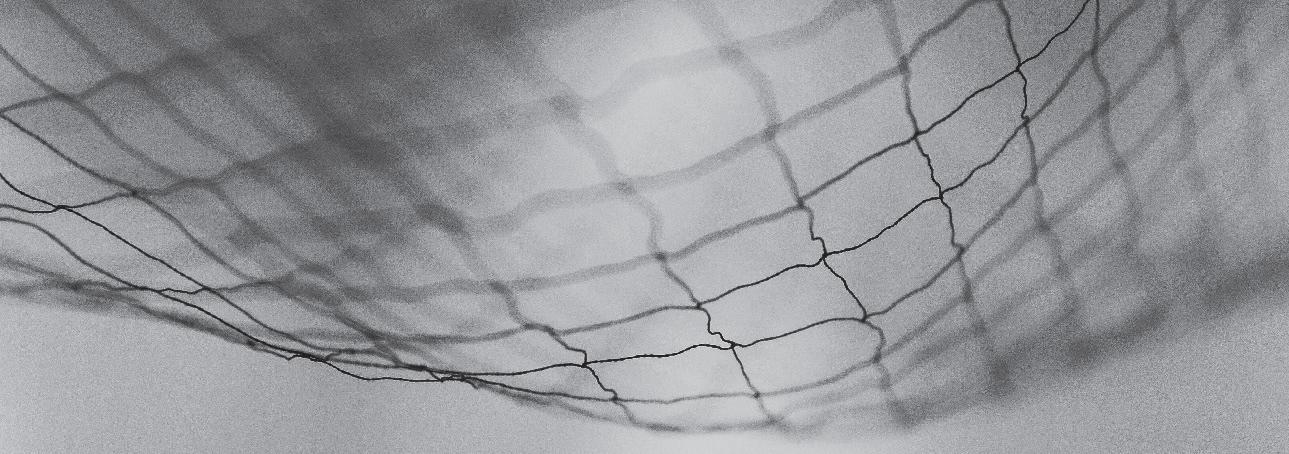
Yet though a moment brought grace descending
(Journey’s beginning as much as ending)
Still all the time there was grace pursuing, Through all my striving the constant wooing, Ever the standing against me leaving, Whispering gently and deeply grieving. Through all my doubting and my assenting, All of my searching—his unrelenting Love was forever atoning, rising, Turning me round again, still surprising. The wonder was not that he won me to him; The wonder was how long before I knew him. v
fI sh net— p hoto by a n D rés c anchón on u nsplash
w edne Sday, Fourth w eek oF lent
by Jennifer Woodruff Tait
When I was a child, my mother (a United Methodist Church musician) and my father (a United Methodist pastor and a musician) frequently performed musical programs for their congregations. One of my earliest memories is of them singing this hymn written in 1836. As with many other great hymns of the church, it draws inspiration from Psalm 23, which pictures God as our shepherd.
Little is known about Dorothy Thrupp other than that she was a prolific writer of hymns for children in nineteenth-century Britain—so it’s no accident that her words touched me as a young person. Although this is her bestknown hymn today, during her life she
was known for another hymn, “A Little Ship Was on the Sea.” It tells the story of Mark 4:35–41, in which Jesus tells the storm to be still, and it ends with these beautiful lines:
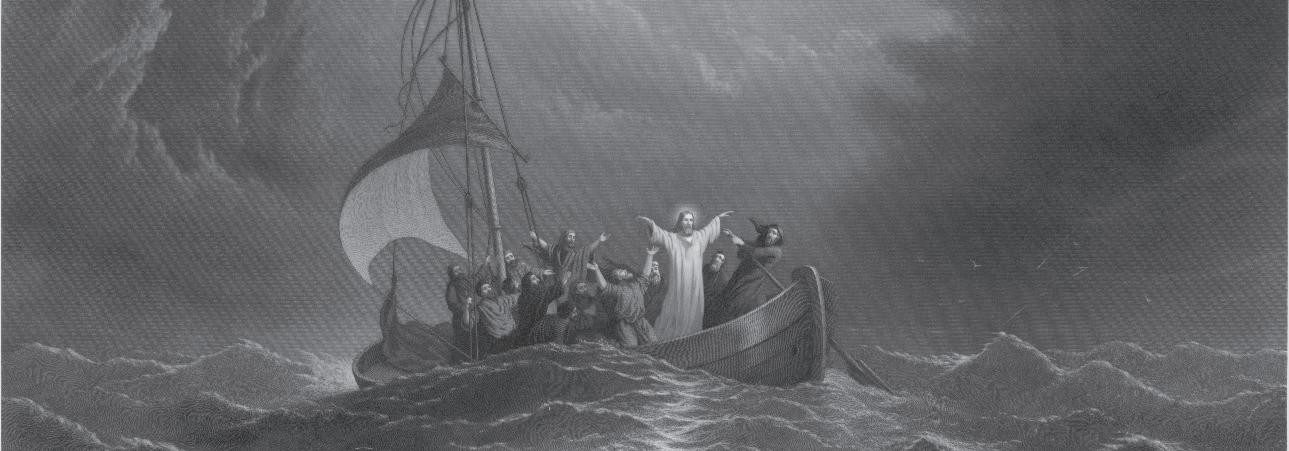
O well we know it was the Lord, our Saviour and our Friend, whose care of those who trust his word will never, never end.
I’ve been without my mom now for 14 years and my dad for 3. For me Thrupp’s words in both hymns beautifully picture the abundant grace of the Christ they served, who relieves, cleanses, frees, and stills our lives’ storms. Indeed the care of those who trust his word will never, never end. v
Christ stillin G the tempest, pa I nte D by James h am I lton; engrave D by s amuel s arta I n, p h I la D elph I a— lI brary of c ongress
Thou hast promised to receive us, Poor and sinful though we be; Thou hast mercy to relieve us, Grace to cleanse, and pow’r to free.
—Dorothy Thrupp (1779–1847), “Savior, Like a Shepherd Lead Us”
Therefore most evidently are we bidden by the teaching of the Lord to confer again the grace of the heavenly sacrament on those guilty even of the greatest sins, if they with open confession bear the penance due to their sin.
—Ambrose (c. 339–c. 397), Concerning Repentance, translated by Augustus Henry Eugene De Romestin (1830–1900)
thurSday, Fourth w eek oF lent
by Max Pointner
In the late fourth century, Ambrose, bishop of Milan, penned a book in response to the Novatian heresy. Novatian had lived several generations previous and, after the Decian persecution, had required extreme penance for those who had denied Christianity and had barred them from the Lord’s Supper. The Novatians, his successors, expanded this practice into a system distinguishing lighter sins from “grievous sins” and requiring rebaptism for gross perpetrators, while still keeping them from full participation in the life of the church.
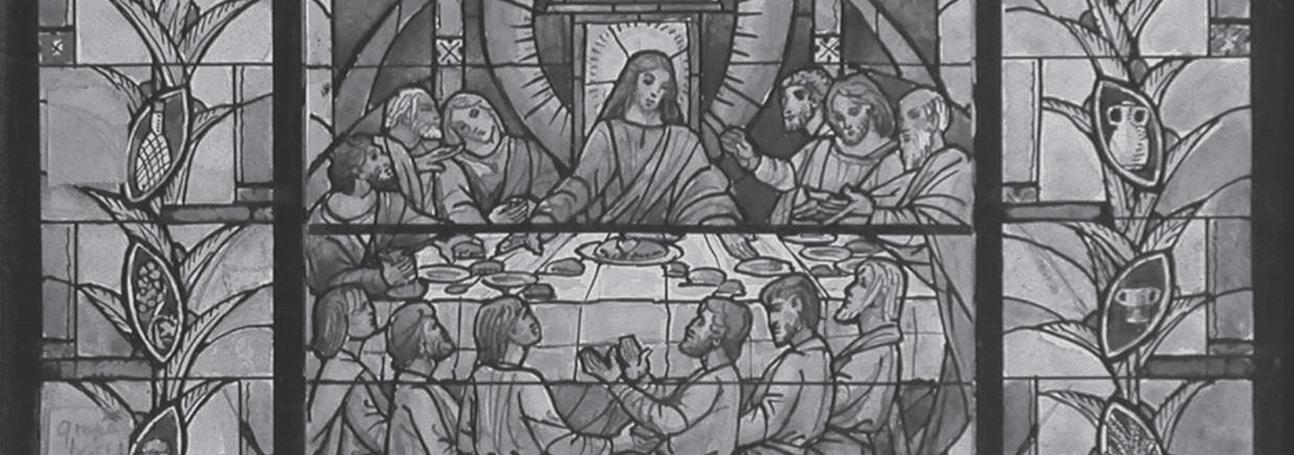
Ambrose’s response, Concerning Repentance, systematically combs the Scriptures to describe the true nature of repentance and the depth of God’s mercy. Ambrose argued that barring sinners from communion with Christ and the church was keeping the sick from their physician. Beginning in the Old Testament, he reflected on pre-atonement expressions of God’s longing for sincere repentance by his people. Moving to the
New Testament, and responding directly to those who had denied their faith under persecution, Ambrose argued that there was even hope for those who fell in persecution: “[Jesus] makes more of that which is merciful. He makes less of what is penal.”
In the wilderness of Lent, I sometimes feel drawn to an utter mortification of myself; focusing on my own sin and the lengths to which I might go to show God I don’t deserve his mercy—without resting in the very mercy by which I am healed. Just as Ambrose advocated for the presence of Christ in the Eucharist to be ministered to even the worst of repentant sinners, so Christ himself instituted the first Lord’s Supper when he knew his disciples, in a matter of hours, would fall asleep, scatter, and even deny him. This is indeed a scandalous mercy. Only once we understand the depth of our sin and our need for penance are we offered Christ’s body and blood, both the diagnosis of and the medicine for our disease. v
[Des I gn D ra WI ng for sta I ne D glass WI n D o W WI th t he l or D ’s s upper]—J. & r l amb s tu DI os / lI brary of c ongress
Let all multiplicity be absent from your prayer. A single word was enough for the publican and the prodigal son to receive God’s pardon. . . . Do not launch into long discourses, for if you do, your mind will be dissipated trying to find just the right words. The publican’s short sentence moved God to mercy. A single word full of faith saved the thief.
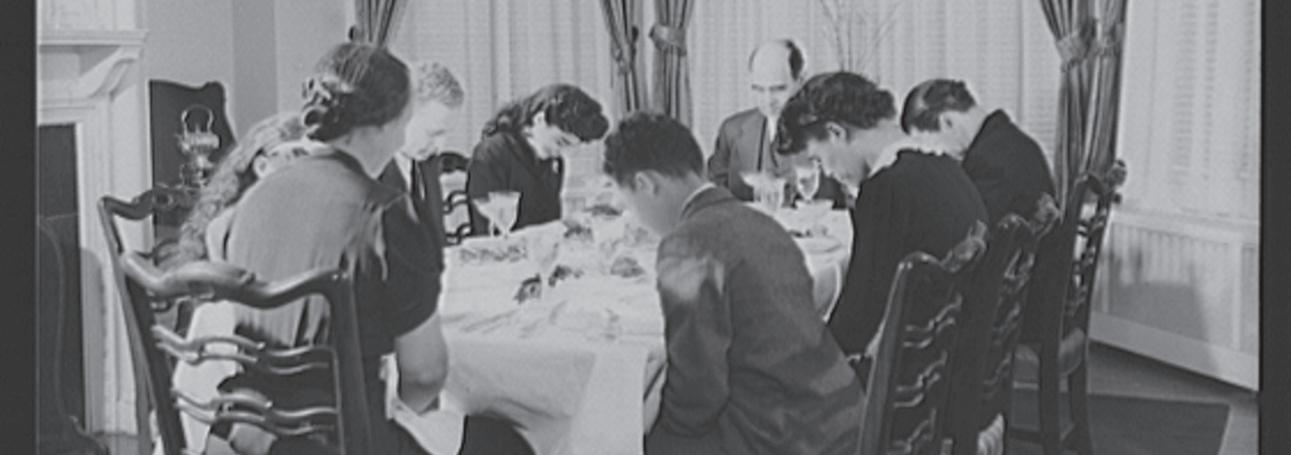
—John Climacus (c. 579–649)
Friday, Fourth w eek oF lent
by Michelle Curtis
When I was a child, I used to get bored by my parents’ long prayers. During our family devotions, they would pray for everyone we knew, and as a 10-year-old, I was ready to get on to game time. So one evening before prayer time, I offered to read a Bible verse before we prayed. I read, “When you are praying, do not heap up empty phrases as the gentiles do, for they think that they will be heard because of their many words. Do not be like them, for your Father knows what you need before you ask him” (Matt. 6:7–8). I felt very clever, having proven that my preference for shorter prayers was biblical.
John Climacus’s instruction reminds me so much of my childhood plea. Yet as an adult, I see that his motives were different from my own. Climacus isn’t so much instructing us not to bore children (or adults!) with long prayers, but rather to come to God in simplicity, focused on God rather than on the eloquence of our own words. The prodigal
son had prepared a whole speech, yet he only had to show up to receive his father’s grace.
I’ve heard so many people say they are “not good at praying.” And I wonder if striving for well-articulated prayers as I do also contributes to others feeling that they do not have the right words to come to God. Yet when Jesus taught his disciples to pray, he gave them the concise words of the Lord’s Prayer.
Whether you think of yourself as “good at praying” or not, I challenge you today to take Climacus’s advice. Come to God with a single word or short prayer. Maybe the words of the tax collector from Jesus’s parable in Luke 18, “God, be merciful to me, a sinner.” Or the words Jesus teaches in the Lord’s Prayer. Or a repetition of Psalm 23:1, “Lord, you are my shepherd, I shall not want.” Come to God with just a few words, and focus on how God receives and welcomes you in such simplicity. v
Wash I ngton, D. c . Dr. m or DI ca Johnson, pres ID ent of h o W ar D u n I vers I ty say I ng grace before t hanksg I v I ng DI nner— g or D on p arks / publ I c D oma I n, WI k I me DI a
tI mothy m ather c ooley, s ket C hes of the l ife and Chara C ter of the r ev. l emuel h aynes, a . m . h arper an D b rothers, 1837
Here lies the dust of a poor hell-deserving sinner who ventured into eternity trusting wholly on the merits of Christ for salvation. In the full belief of the great doctrines he preached while on earth, he invites his children, and all who read this, to trust their eternal interest in the same foundation.
—Epitaph of Lemuel Haynes (1753–1833)

Saturday, Fourth w eek oF lent
by Jennifer Woodruff Tait
Idid not grow up in a church tradition where funerals usually involved altar calls. The funerals of my childhood presented the love of Christ and spoke of how the deceased now rested in the presence of Christ, but the liturgy did not generally call on hearers to decide their own eternal destiny at that moment.
For that reason Lemuel Haynes’s epitaph startled me just a little when I first encountered it. Haynes was a mixed-race verteran of the American Revolution, abolitionist, and Congregational pastor. His parentage is to this day uncertain, and at five months old, he became an indentured servant to a Massachusetts farmer (what service a five-month-old could have rendered to anyone seems quite unclear!). When
Haynes turned 21, he was freed and joined the army. Throughout his life he campaigned against slavery, and in 1788 he became the first Black man to be ordained in the new United States. Meditating on Haynes’s tumultuous life, though, I thought of one of this week’s Scriptures: “For by grace you have been saved through faith, and this is not your own doing; it is the gift of God—not the result of works, so that no one may boast” (Eph. 2:8–9). From his childhood conversion until the end, this belief obviously sustained Haynes so strongly that even on his tombstone he wanted to make sure others knew where to find what he had found. And that—as they said even in my childhood tradition— will preach. v
FiFth Sunday
Do not remember the former things, or consider the things of old. I am about to do a new thing; now it springs forth, do you not perceive it? I will make a way in the wilderness and rivers in the desert.
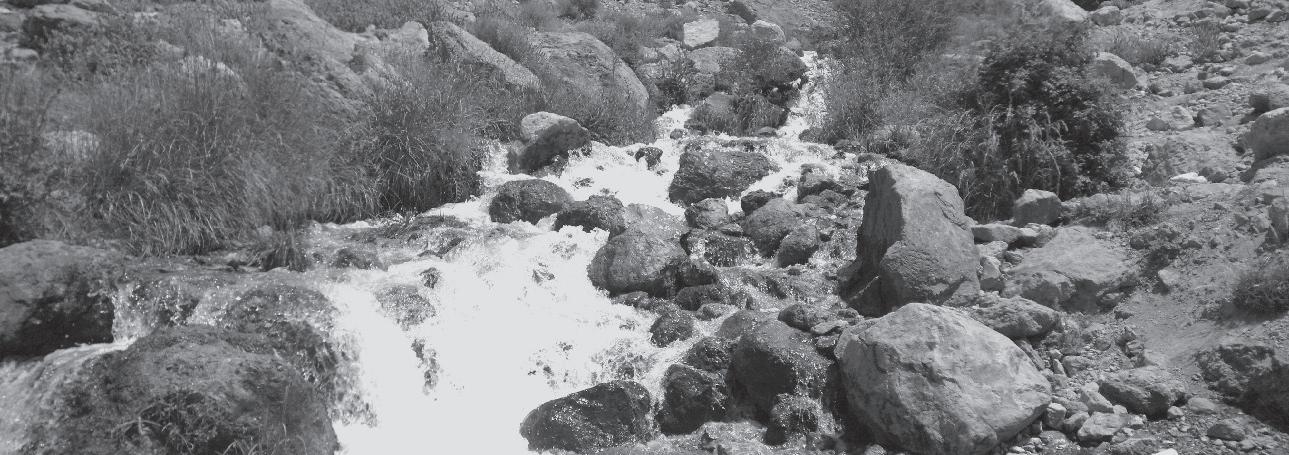
(Isaiah 43:18–19)
Out of the depths I cry to you, O LORD. Lord, hear my voice! Let your ears be attentive to the voice of my supplications!
(Psalm 130:1–2)
Very truly, I tell you, unless a grain of wheat falls into the earth and dies, it remains just a single grain; but if it dies, it bears much fruit. Those who love their life lose it, and those who hate their life in this world will keep it for eternal life.
(John 12:24–25)
Spring Mi S hi Si S akht—Milad g era M i / [CC-BY-S a 3.0 ] Wiki M edia
 Mishi Spring, Sisakht, Iran, by Milad Gerami
Mishi Spring, Sisakht, Iran, by Milad Gerami
How beautiful the picture given, telling us of the river of blessing that flows all through our lives, and we have only to reach by faith and praise to find our wants supplied in the most barren desert.
—Lettie
Cowman (1870–1960), Streams in the Desert
monday, FiFth week oF lent
by Kaylena Radcliff
Where I live in Pennsylvania, water scarcity is almost never a problem. Wells and waterways are everywhere. I’ll never forget how jarring it was when, on a flight to San Diego, I looked down and saw the desert for the first time. It stretched on and on—miles of emptiness that I knew were far vaster than I could really comprehend, given my bird’s-eye view. As we drew closer to our destination, we flew over a reservoir. I knew it had to be huge, but in the middle of that barren expanse, it looked small and insufficient. Just recalling it now makes me want to reach for a tall glass of water.
God’s people understood the power of such thirst in the desolate places.
Their prophets and psalmists pictured it often with spiritual implications, displaying just how barren the wilderness of our lives will be without the One who makes the waters flow. When Jesus walked the earth, he pointed the woman at the well to the “living water” that only he could give: the water that will spring up within for eternal life (John 3:14). God, the wellspring and from whom all our blessings flow, is the only source of our satisfaction. And as Lettie Cowman reminds us, that relief is never far off. The river of his blessing flows ever on through the desert places, never diminishing, always satisfying. We need only reach out, cup our hands in the flow, and drink. v
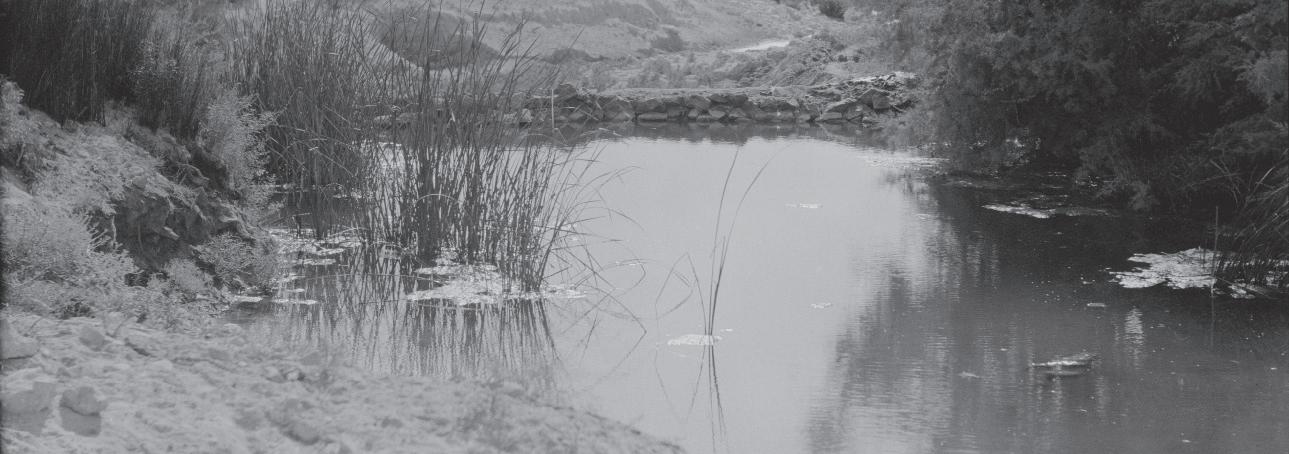 t o Sinai BY C ar. a in g edeirat— aM eri C an Colon Y (Jeru S ale M ). p hoto d epart M ent, photographer. l i B rar Y of Congre SS
t o Sinai BY C ar. a in g edeirat— aM eri C an Colon Y (Jeru S ale M ). p hoto d epart M ent, photographer. l i B rar Y of Congre SS
The gate that gives entry into these riches of his wisdom is the cross; because it is a narrow gate, while many seek the joys that can be gained through it, it is given to few to desire to pass through it.
—Juan
de la Cruz (1542–1591), “Spiritual Canticle”
tue Sday, FiFth week oF lent
by Meg Moss
When I began to walk the way of Alzheimer’s with my husband several years ago, God stood at the narrow gate and beckoned me in. I had little choice but to enter. Without its narrowness, how would I know the wideness of God’s mercy? Without the darkness, how would I see the light of Christ? Without the wound, how would God enter my heart? These are the tensions that I embrace and the mysteries that I face as I continue along the path.

When I was confirmed at age eight, my father inscribed my brand new Book of Common Prayer : “Never deny a mystery, it is a link to all that is possible. Even love.”
So I give thanks to God for his immanent presence in my life, particularly in the dark and narrow and wounded places. He’s met me there, with his light, his breadth, his healing, and his love. v
k ing John’ S Ca S tle—Willia M Murph Y fro M d u B lin, i reland / [CC-BY-S a 2.0 ] Wiki M edia
Thousands of the flock of Christ can testify that when they have put themselves absolutely into His hands, He has quieted the raging tempest, and has turned their deserts into blossoming gardens.
—Hannah Whitall Smith (1832–1911), The God of All Comfort
w edne Sday, FiFth week oF lent
by Dawn Moore
Several years ago, a large purplish-blue pigeon took up residence in my yard. He waddled around and seemed to be looking for something. When he was back the second day, we named him “Bert,” brought him water, and tried to figure out what to feed him. Day after day there was Bert, waddling around, refusing our food, and always staying just out of reach.
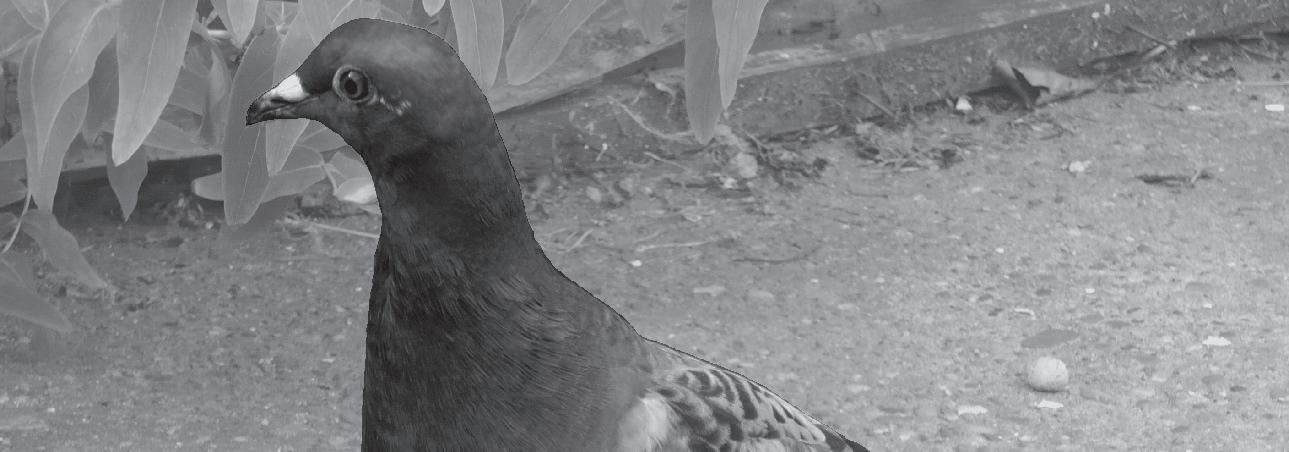
An internet search soon confirmed our suspicions: Bert was a homing pigeon who had lost his way. He was someone’s pet and the federal government protected him against harm. All our efforts to help him were fruitless. Day after day he grew weaker until finally on day seven we were able to get close enough to photograph his identification band. Minutes later we located
and phoned his owner. It turns out Bert was really Bertha, a young female homing pigeon who had taken a wrong turn on her maiden flight.
Though she was in great distress, Bertha would not allow us nearby. Once her rightful owner arrived, she immediately went to him and quickly received urgent care. Bertha knew her owner so well that she waited for him even when close to death.
I don’t know about you, but I have trouble waiting for God when I’m in distress. My first instinct is to wallow in the “raging tempest” and search for a human escape from the desert. Bertha reminds me to listen for the voice of the One who knows me best, who hears my cries, and who can lead me on the path of wholeness. v
A homing pigeon on A p A th outside, 2010 o ffi C iall Y _Mr_X / [CC-BY-S a 4.0 ] Wiki M edia
You are the great High Priest; you have prepared the feast of holy love; and in our mortal pain none calls on you in vain; our plea do not disdain; help from above.
Clement of Alexandria (c. 150–c. 215), translated by Henry Dexter (1821–1890)
thurSday, FiFth week oF lent
by Michelle Curtis
What role have psalms played in your life of prayer?

For me they’ve been instrumental in teaching me to call out to God from the depths. Psalms teach us brutal honesty with God. We could paraphrase Psalm 130 with something like, “God, I’m in the pit. Listen to me!” I love the rawness and directness of this prayer—not polished or polite but rather a bold cry from desperation.
I’m so encouraged that both the psalms and the early church sometimes provide exactly the words I need to say to God. Especially when my own words fail me. I remember a time when the pit felt so deep that I had very few words for God. It was through singing the words of Psalm 13 in a choir that I could finally find expression for the prayers of my heart.
Clement’s words echo the psalmist, pleading for God to listen to our desperate cries from the depths. Yet both teach us to articulate our despair and our hope, almost in the same breath. Clement describes God’s holy feast of love, reminding us that our prayers are not in vain. The end of Psalm 130 instructs the people to hope in God. Even from the depths. Even when despair sets in. Even when all we can do is call out: “God, listen to me! It’s really bad down here.” Praying the psalms doesn’t brush over our anguish but brings it to God and reminds us that we can truly put our hope in God—even when God feels ever so distant.
What part of Psalm 130 speaks to your heart today? Can you pray these words to God? v
[Bi B le open to the pS al MS ]— p hoto BY a aron Burden on u n S pla S h
Who was that grain? It was the Lord Jesus. In the whole universe God had only one “grain of wheat;” He had no second grain. God put His one grain of wheat into the ground, and it died, and in resurrection the only begotten grain became the first begotten grain, and from the one grain there have sprung many grains.
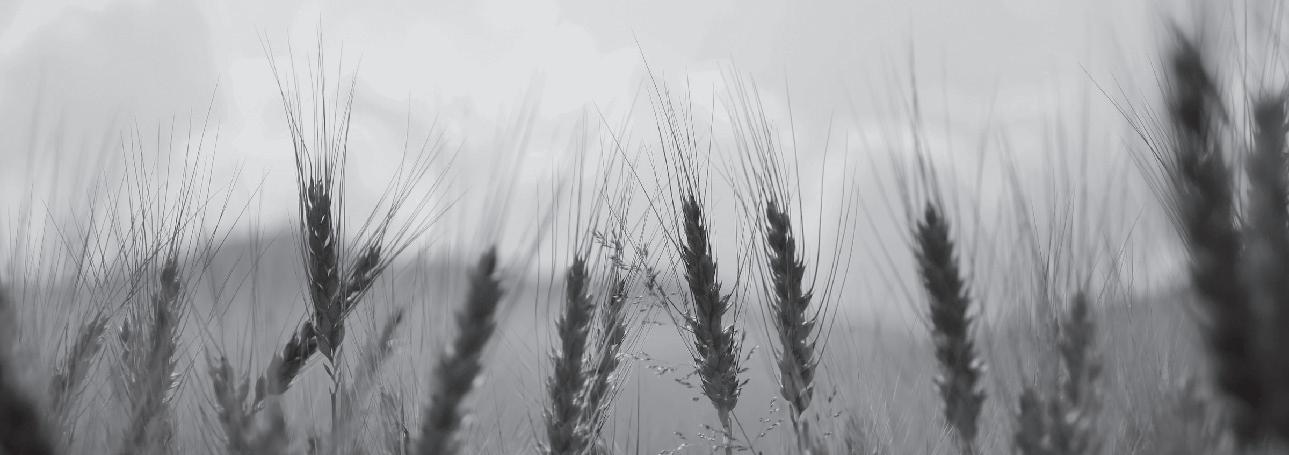
—Watchman Nee (1903–1972), The Normal Christian Life Friday, FiFth week oF lent
by Kellie Mitchell
Can’t you see it? Passover celebrants waving palm branches and shouting praises of “Hosanna! Blessed is he who comes in the name of the Lord! ” as Jesus rides a donkey down the Mount of Olives. So many people were there, both Jews and Greeks, that the Pharisees’ fears of “look, the world has gone after him!” (John 12:9) seem to me a joyful prediction rather than a nervous accusation.
I spent the fall of 2022 in Jerusalem, studying the land, reading ancient texts, and feeling the Bible come alive in front of my eyes. During one of our field studies, we descended from the Mount of Olives down through the Kidron Valley and up to Jerusalem’s walls—the same path Jesus would have taken on his final journey. The path is steep, winding, and even to this day thronged with people. At the bottom sits an enclosed garden of olive trees surrounding the Church of All Nations, the place tradition says Jesus went to pray before his arrest (John 18). In John 12 Jesus declares that his death
would “bear much fruit” to the glory of God. In 18:27 Jesus shows his feelings about this greatest of sacrifices: “Now my soul is deeply troubled. Should I pray, ‘Father save me from this hour?’ But this is the very reason I came!”
The Greeks who cautiously approached Jesus here received eternal hope: “Very truly, I tell you, unless a grain of wheat falls into the earth and dies, it remains just a single grain; but if it dies, it bears much fruit” (John 12:24–25).
The parabolic statement so typical of Jesus is eloquently summarized here by Watchman Nee. We also visited eight different monasteries. Some are ancient ruins, requiring a vivid imagination to reconstruct their brilliance. Others are still active. Each monastery has a different belief about how God should be worshiped: Catholic, Romanian Orthodox, Greek Orthodox, Syrian, Ethiopian, Protestant. And still these many grains all point to “the only begotten grain,” Jesus. v
[ g rain]—photo BY Mar C Wieland on u n S pla S h
St. i gnatiu S of a ntio C h fed to the lion S —fro M t iele M an Jan S z Braght, t he mA rtyr’s m irror, 1685 . r i J k SM u S eu M / pu B li C do M ain, Wiki M edia

I am the wheat of God and am ground by the teeth of the wild beasts, that I may be found the pure bread of Christ.
—Ignatius of Antioch (d. 107), “Letter to the Romans”
Saturday, FiFth week oF lent
by Jennifer Woodruff Tait
My career as a church historian did not begin auspiciously. In my very first course studying church history in seminary, I mixed up Ignatius of Antioch and Ignatius of Loyola on a test. Almost 1,500 years separate these two saints of the church—one a first-century bishop and martyr and one a sixteenth-century founder of a missionary religious order.
Like many of the earliest church fathers and mothers, we know little about the life of the earlier Ignatius beyond his role as a leader of the growing Christian community and what is recorded in his own letters. Tradition holds that he was a disciple of the apostle John.
Even his journey to Rome for his martyrdom is confusing—those convicted of being Christians were usually executed locally. His captors seem to
have taken him by a very indirect route, allowing him to meet with growing churches and to send many letters to other churches and to Polycarp, bishop of Smyrna. We’re not even sure which emperor Ignatius was executed under.
Despite all these unknowns, it is clear that Ignatius cared for his colleagues and disciples—writing to them about everything from theological debates to practical aspects of church management. He also clearly knew and accepted his fate.
His language here recalls that of the Lord Jesus Christ, the One who told us to eat his body and drink his blood, and who reminded us that “unless a grain of wheat falls into the earth and dies, it remains just a single grain; but if it dies, it bears much fruit” (John 12:24).
Holy Week is upon us. Let us walk the way of the cross. v
Palm/Passion sunday
Hosanna! Blessed is the one who comes in the name of the Lord! Blessed is the coming kingdom of our ancestor David! Hosanna in the highest heaven!
(Mark 11:9b–10)
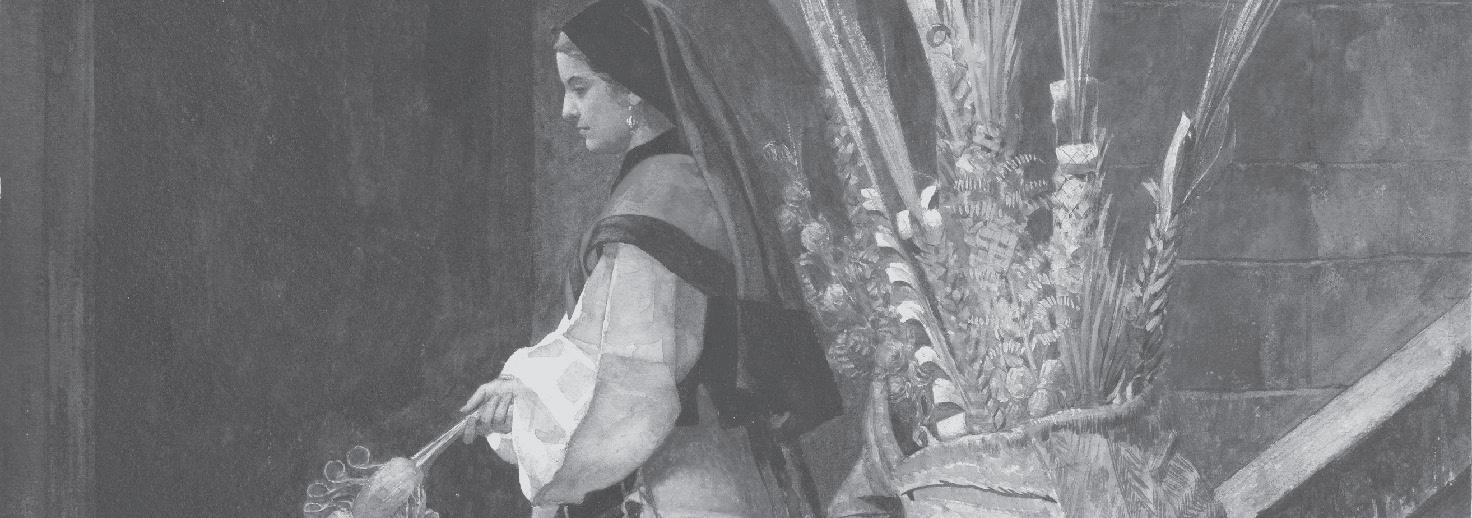
Let the same mind be in you that was in Christ Jesus, who, though he was in the form of God, did not regard equality with God as something to be exploited, but emptied himself, taking the form of a slave, being born in human likeness. And being found in human form, he humbled himself and became obedient to the point of death—even death on a cross.
(Philippians 2:5–8)
Jean-Geor G es Vibert, Palm Sunday in S P ain —Catharine Lori LL ard Wo L fe Co LL e C tion, b equest of Catharine Lori LL ard Wo L fe, 1887 / [CC 0 ] Wikimedia
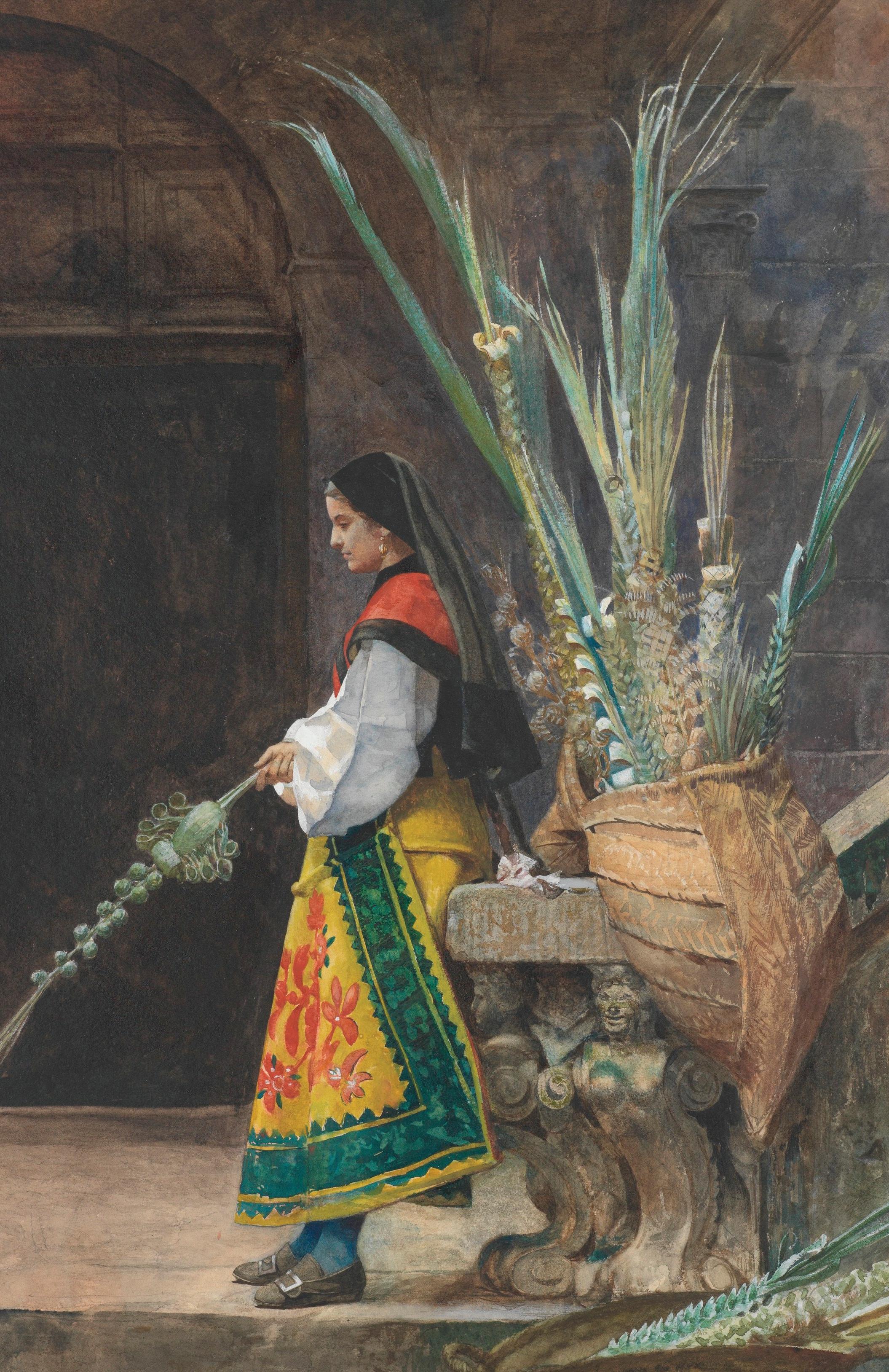 Palm Sunday in Spain, Jean-Georges Vibert
Palm Sunday in Spain, Jean-Georges Vibert
Be the cross our theme and story, We who in the cross’s glory Shall exult forevermore.
—Adam of St. Victor (12th c.), translated by John Mason Neale (1818–1866)
by Michelle Curtis
Adam of St. Victor says: The cross is our story.
In my own life, I’ve found that I hear the story of the cross so often I can become numb to it. But when you slow down to take it in, Adam’s claim is quite shocking. At the center of our faith is a story about God dying a brutal death at human hands. Our story is a story about God becoming just like us, even knowing the very worst of human suffering. Our story is about a God who gave us everything and identifies with the least of these.
How might this story strike you as you prepare to journey through Holy Week this year? Are you open to letting it surprise you or take on new life as you hear it again? Are you ready to claim
with Adam: “Be the cross our theme and story”?
Paul writes in Philippians, “Let the same mind be in you that was in Christ Jesus.” Jesus who emptied himself and obeyed God even unto death. Jesus who rightfully had all the power and honor of being a member of the Trinity, yet gave it all up to become a lowly human being. We should have that kind of a mindset.
The cross isn’t just our story because we tell it year after year. The cross is our story because Jesus instructs us to take up our own cross and follow him. How might Jesus be asking you to follow him in this Holy Week? What kind of power or honor do you have that you might choose to give up rather than use to your own advantage? v
 Croix du n i V o L et s a V oie, f ran C e—Photo by a drien oL i C hon on u ns PL ash
monday in Holy Week
Croix du n i V o L et s a V oie, f ran C e—Photo by a drien oL i C hon on u ns PL ash
monday in Holy Week
 Croix du Nivolet Savoie, France
Croix du Nivolet Savoie, France
Life is long and full of crosses and we have need to look on Christ our pattern, to see how He bore His trials, and even to take example by His Apostles and saints if we would bear our own trials perfectly.
—Teresa of Ávila (1515–1582), The Interior Castle
tuesday in Holy Week
by Edwin Woodruff Tait The
Two Messengers
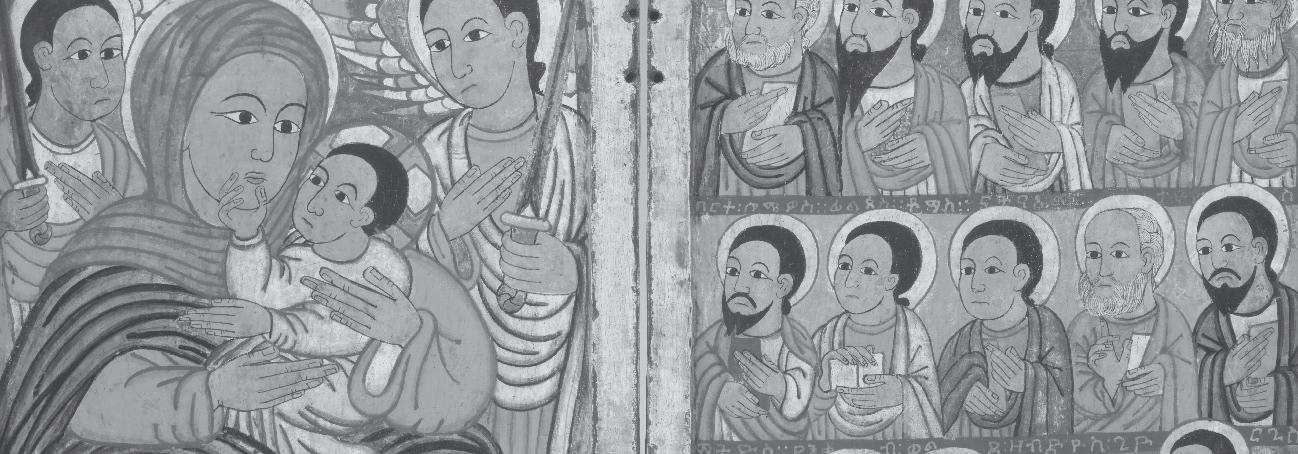
Perhaps to the clear-eyed angel
There was nothing in the word he brought but glory: Infinite splendor in a point of flesh, Bursting, breaking through the veil of blood and mucus, Passing through a narrow gate To fill creation with redoubled light.
Only the old man, his rheumy eyes Blurred with false hopes,
Back scarred by Roman rods, Feet hard with trudging up the stony hill
To watch the heroes die, Only he, perhaps, could taste in his body the sourness of the sweet word, Could see the sword quivering in the stainless heart, And know in what bitter way the glory comes. v
re s eyon, d i P ty C h W ith m ary and h er s on fL anked by a r C han G e L s, aP ost L es and a s aint—Wa L ters 3612 Wa L ters a rt m useum / P i C ry L C om
f
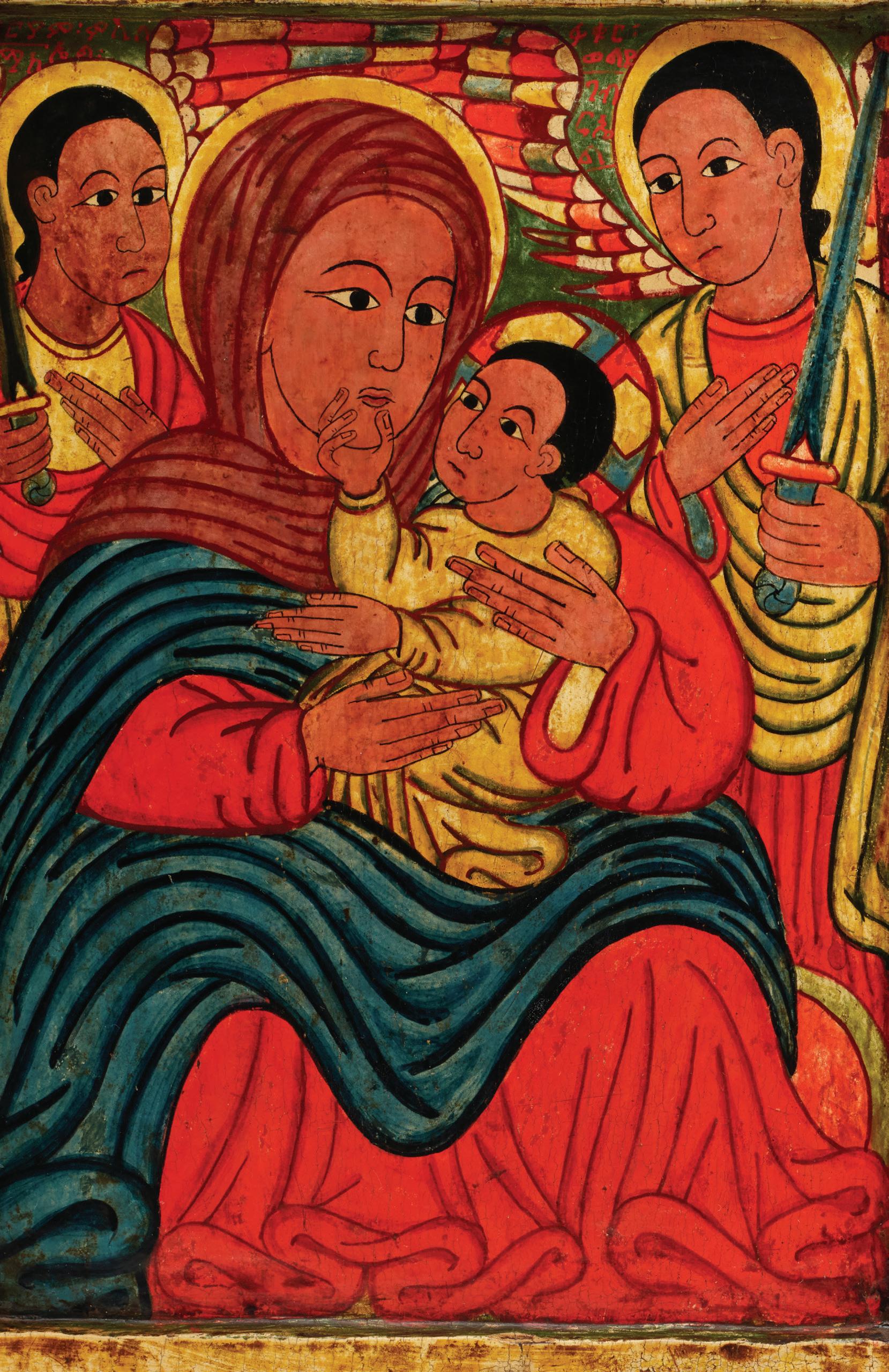 Diptych with Mary and Her Son Flanked by Archangels, Apostles and a Saint, Fre Seyon
Diptych with Mary and Her Son Flanked by Archangels, Apostles and a Saint, Fre Seyon
The believing soul longs and faints for God; she rests sweetly in the contemplation of Him.
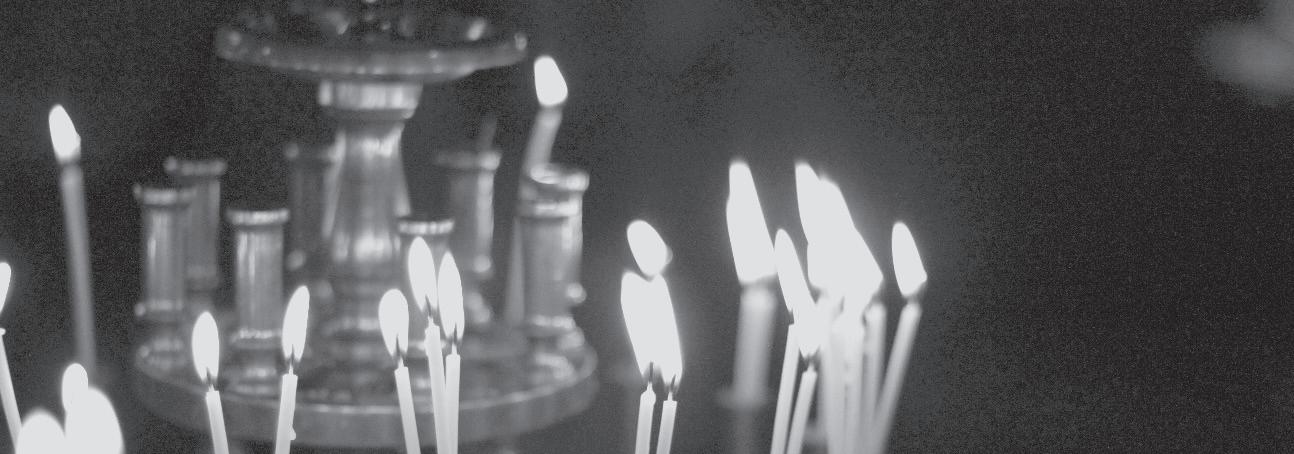
She glories in the reproach of the Cross, until the glory of His face shall be revealed.
—Bernard of Clairvaux (1090–1153), On Loving God
Wednesday in Holy Week
by Chris R. Armstrong
Probably best known today for hymns such as “O Sacred Head Now Wounded” and “Jesus, the Very Thought of Thee,” Bernard of Clairvaux was a formative figure in medieval devotion. A reforming monk of the Cistercian order, Bernard returned to the simplicity of the Rule of Saint Benedict, recruited participants for the Second Crusade in 1146, and in later life had so much power that he was the virtual pope of the Western church.
Throughout his career Bernard’s teaching focused on love—in a positive, personal vein, but not a sentimental one. Bernard emphasized the importance of the human Jesus for Christian spirituality. He referred to the New Testament portrait of Jesus, not merely as an example of a holy life,
but as a picture of the divine action of love to change the hearts of human beings.
He also talked about the loving relationship between the self and God. Borrowing a good deal from Augustine, Bernard, in his treatise On Loving God, set forth four degrees of this love. He saw the self first of all loving only itself, then loving the neighbor and God for its own sake. Third, the soul comes to love God for God’s sake, normally the highest plane of love. But there is a fourth level, in which the soul loves itself for God’s sake. This is found only fleetingly on Earth but will be the constant state of the dead after the resurrection of the body.
Where are you on the journey to loving God this Holy Week? v
Cand L es in the o rthodox Chur C h, b u LG aria— b iser t odoro V / [CC-
sa
] Wikimedia
by
4.0
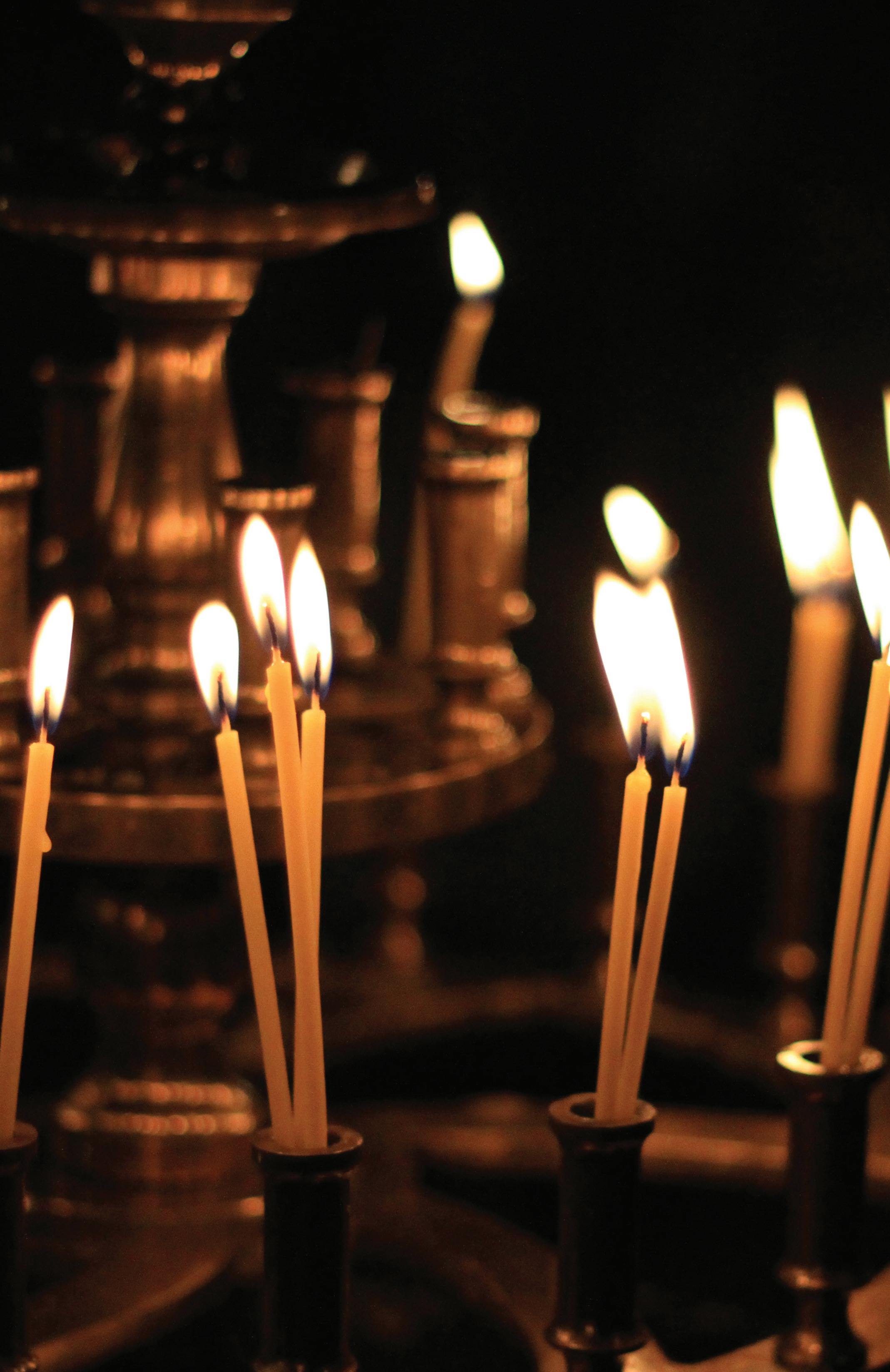 Orthodox church, Bulgaria
Orthodox church, Bulgaria
maundy tHursday
For I received from the Lord what I also handed on to you, that the Lord Jesus on the night when he was betrayed took a loaf of bread, and when he had given thanks, he broke it and said, “This is my body that is for you. Do this in remembrance of me.” In the same way he took the cup also, after supper, saying, “This cup is the new covenant in my blood. Do this, as often as you drink it, in remembrance of me.” For as often as you eat this bread and drink the cup, you proclaim the Lord’s death until he comes. (1 Corinthians 11:23–26)

i n S
titution of the e uchari S t m o S aic k en Pau L sen [CC bysa 2.0 ] fL i C kr
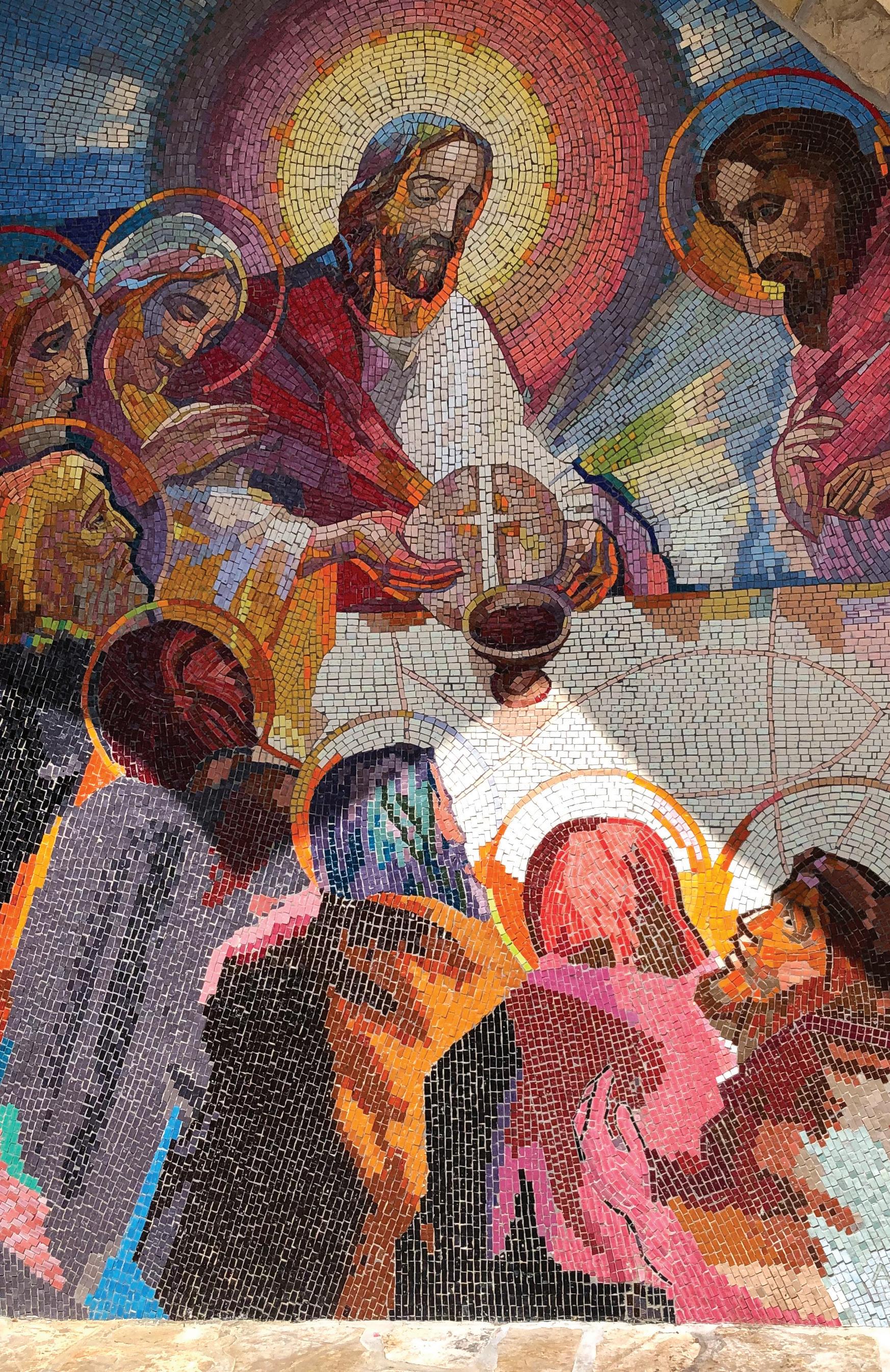 Institution of the Eucharist Mosaic, St. James Church, Medjugorje, Bosnia and Herzegovina
Institution of the Eucharist Mosaic, St. James Church, Medjugorje, Bosnia and Herzegovina
Were you there when they crucified my Lord?
Oh, were you there when they crucified my Lord?
Oh, sometimes it causes me to tremble, tremble
Were you there when they crucified my Lord?
—Traditional Black spiritual
Good Friday
by Chris R. Armstrong
What a supreme paradox. We now call the day Jesus was crucified, Good.
Many believe this name simply evolved, as language does. They point to “God’s Friday” as its root. This seems reasonable, given that “goodbye” evolved from “God be with you.” Whatever its origin the current name of this holy day offers a fitting lesson to those of us who assume that “good” must mean “happy.”
The church has always understood that the first Good Friday was anything but happy. Sadness, mourning, fasting, and prayer have been its focus since Christianity’s early centuries. A fourth-century church manual, the Apostolic Constitutions, calls Good Friday a “day of mourning, not a day of festive Joy.” Ambrose, the archbishop who befriended Augustine, called it the “day of bitterness on which we fast.”
Many Christians have historically kept their churches unlit or draped in
dark cloths on this day. Processions of penitents have walked in black robes or carried black-robed statues of Christ and the Virgin Mary. And worshipers have walked the Stations of the Cross, praying and singing their way past 14 images representing Jesus’s steps along the Via Dolorosa to Golgotha.
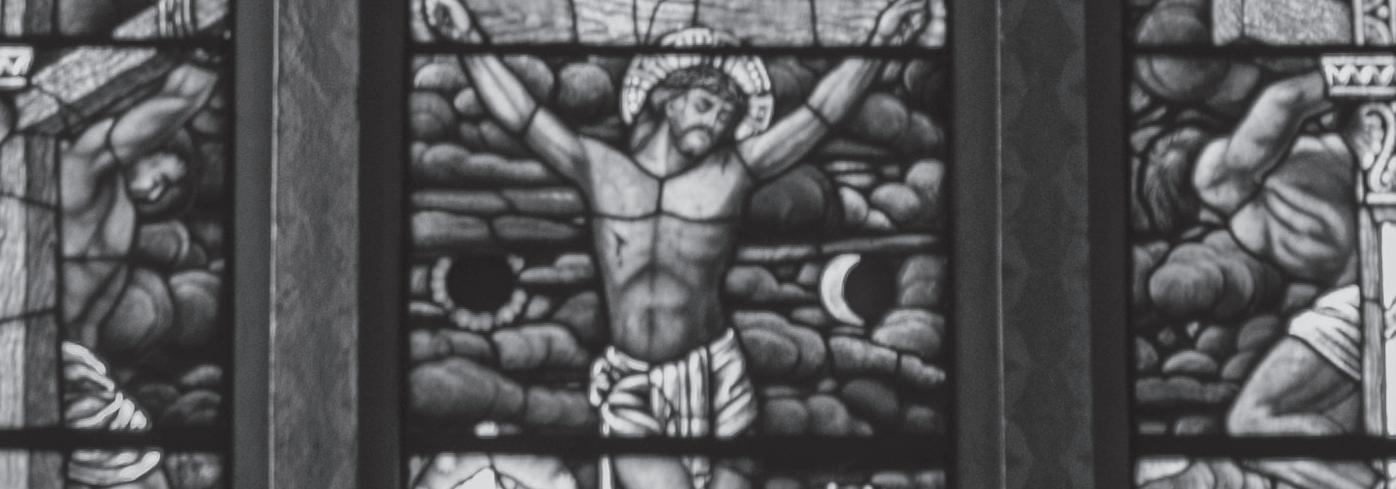
Yet, despite—indeed because of—its sadness, Good Friday is truly good. Its sorrow is a godly sorrow. In the midst of consumerism’s Western playground, Good Friday calls to a jarring halt the sacred “pursuit of happiness.” The cross reveals this pursuit for what it is: a secondary thing. To pursue happiness we must first experience sorrow. He who goes forth sowing tears returns in joy.
Good Friday has always challenged mere human goodness. Its sad commemoration reminds us that in the face of sin, our goodness avails nothing. Only One is good enough to save us. That he did so is cause indeed for celebration. v
s tained GL ass h o L y s a C rament Chur C h in i ta J ai, b razi L P hoto by m ateus Cam P os f e L i P e on u ns PL ash
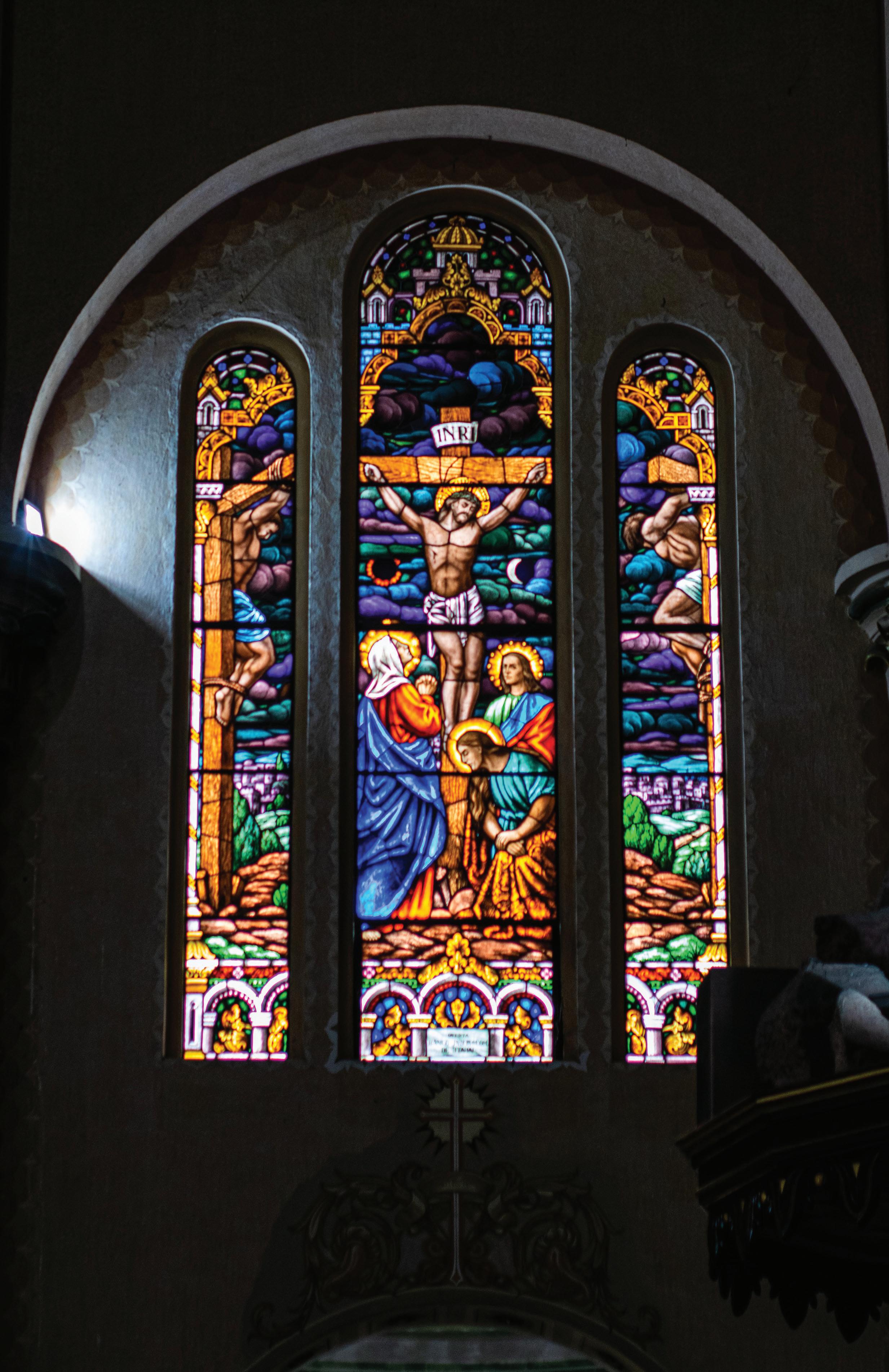 Blessed Sacrament Church, Itajaí, Brazil
Blessed Sacrament Church, Itajaí, Brazil
Holy saturday
For there is hope for a tree, if it is cut down, that it will sprout again, and that its shoots will not cease. Though its root grows old in the earth, and its stump dies in the ground, yet at the scent of water it will bud and put forth branches like a young plant. But mortals die, and are laid low; humans expire, and where are they? As waters fail from a lake, and a river wastes away and dries up, so mortals lie down and do not rise again; until the heavens are no more, they will not awake or be roused out of their sleep. Oh that you would hide me in Sheol, that you would conceal me until your wrath is past, that you would appoint me a set time, and remember me! If mortals die, will they live again? All the days of my service I would wait until my release should come.
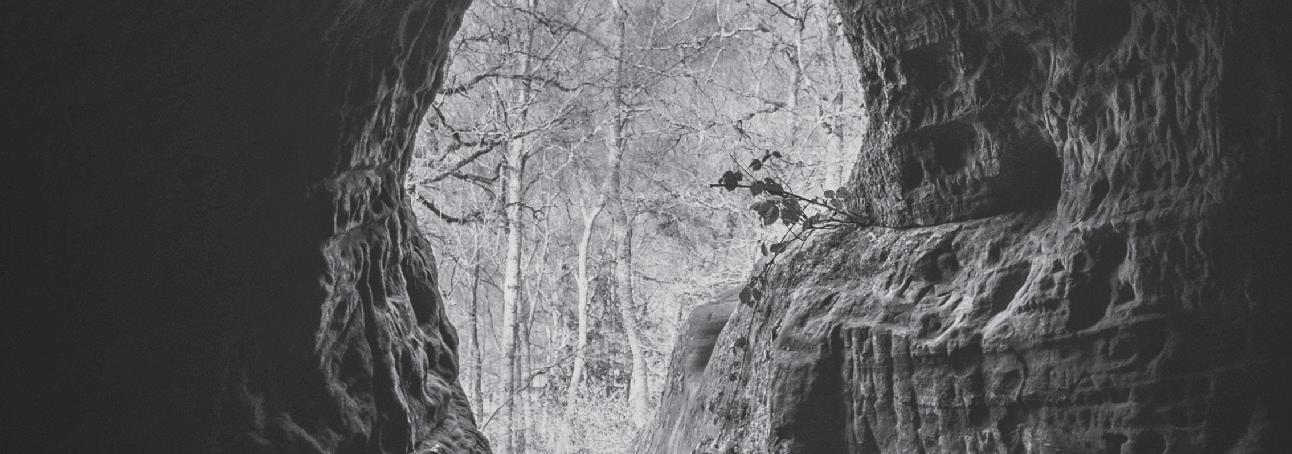
(Job 14:7–14)
When it was evening, there came a rich man from Arimathea named Joseph, who also was himself a disciple of Jesus. He went to Pilate and asked for the body of Jesus; then Pilate ordered it to be given to him. So Joseph took the body and wrapped it in a clean linen cloth and laid it in his own new tomb, which he had hewn in the rock. He then rolled a great stone to the door of the tomb and went away. Mary Magdalene and the other Mary were there, sitting opposite the tomb.
(Matthew 27:57–61)
k in V er e d G e, k in V er, s tourbrid G e, uk P hoto by bL ake s herman on u ns PL ash
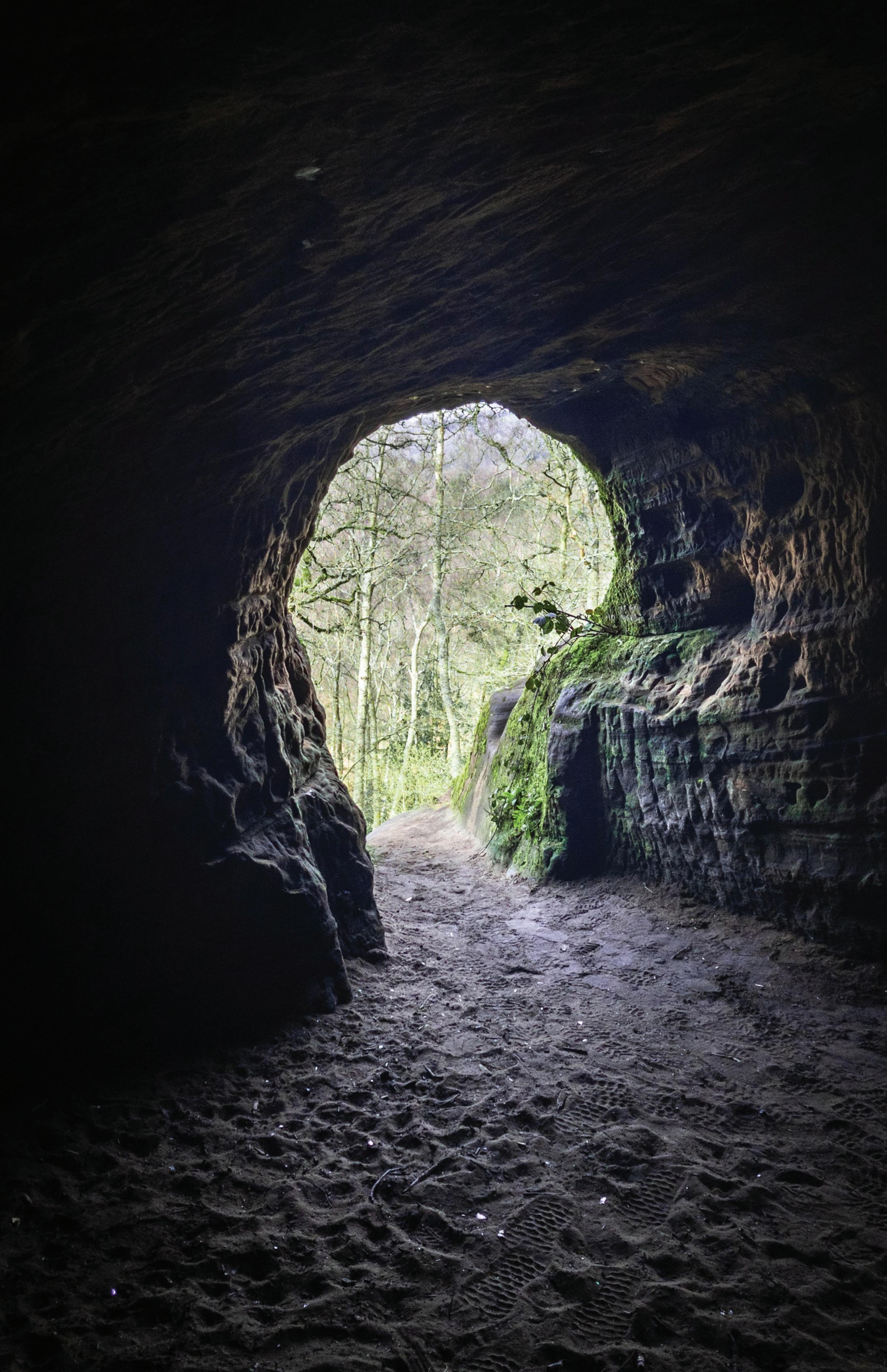 Kinver Edge, Kinver, England
Kinver Edge, Kinver, England
EastEr sunday
Doyou not know that all of us who have been baptized into Christ Jesus were baptized into his death? Therefore we have been buried with him by baptism into death, so that, just as Christ was raised from the dead by the glory of the Father, so we too might walk in newness of life. For if we have been united with him in a death like his, we will certainly be united with him in a resurrection like his. We know that our old self was crucified with him so that the body of sin might be destroyed, and we might no longer be enslaved to sin. For whoever has died is freed from sin. But if we have died with Christ, we believe that we will also live with him. We know that Christ, being raised from the dead, will never die again; death no longer has dominion over him. The death he died, he died to sin, once for all; but the life he lives, he lives to God. So you also must consider yourselves dead to sin and alive to God in Christ Jesus.
(Romans 6:3–11)
Asthey entered the tomb, they saw a young man, dressed in a white robe, sitting on the right side; and they were alarmed. But he said to them, “Do not be alarmed; you are looking for Jesus of Nazareth, who was crucified. He has been raised; he is not here. Look, there is the place they laid him. But go, tell his disciples and Peter that he is going ahead of you to Galilee; there you will see him, just as he told you.”
(Mark 16:5–7)
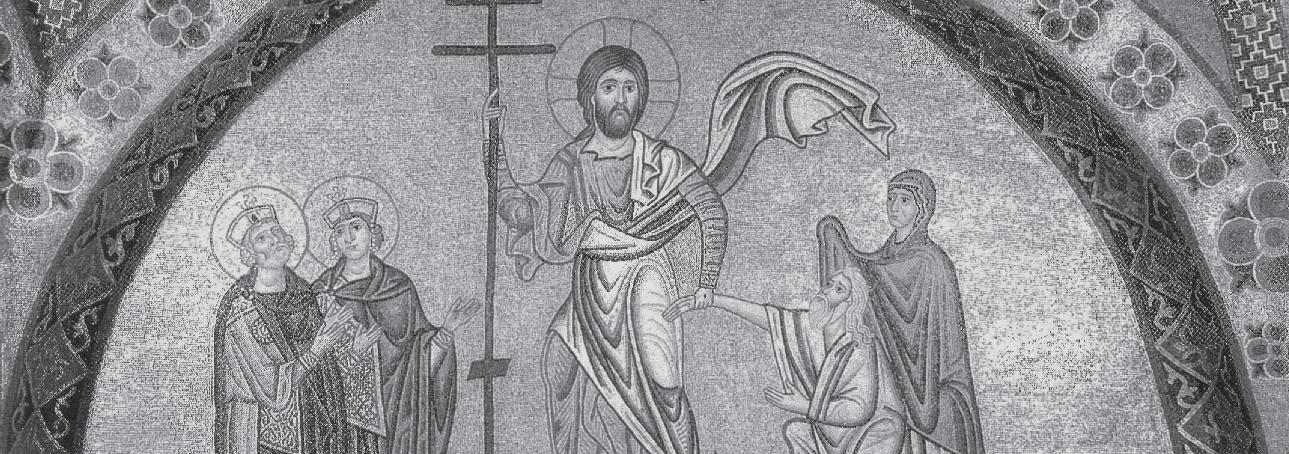 Hosios Loukas, Harrowing of Hell —anonimus / pub L ic domain, wikimedia
Hosios Loukas, Harrowing of Hell —anonimus / pub L ic domain, wikimedia
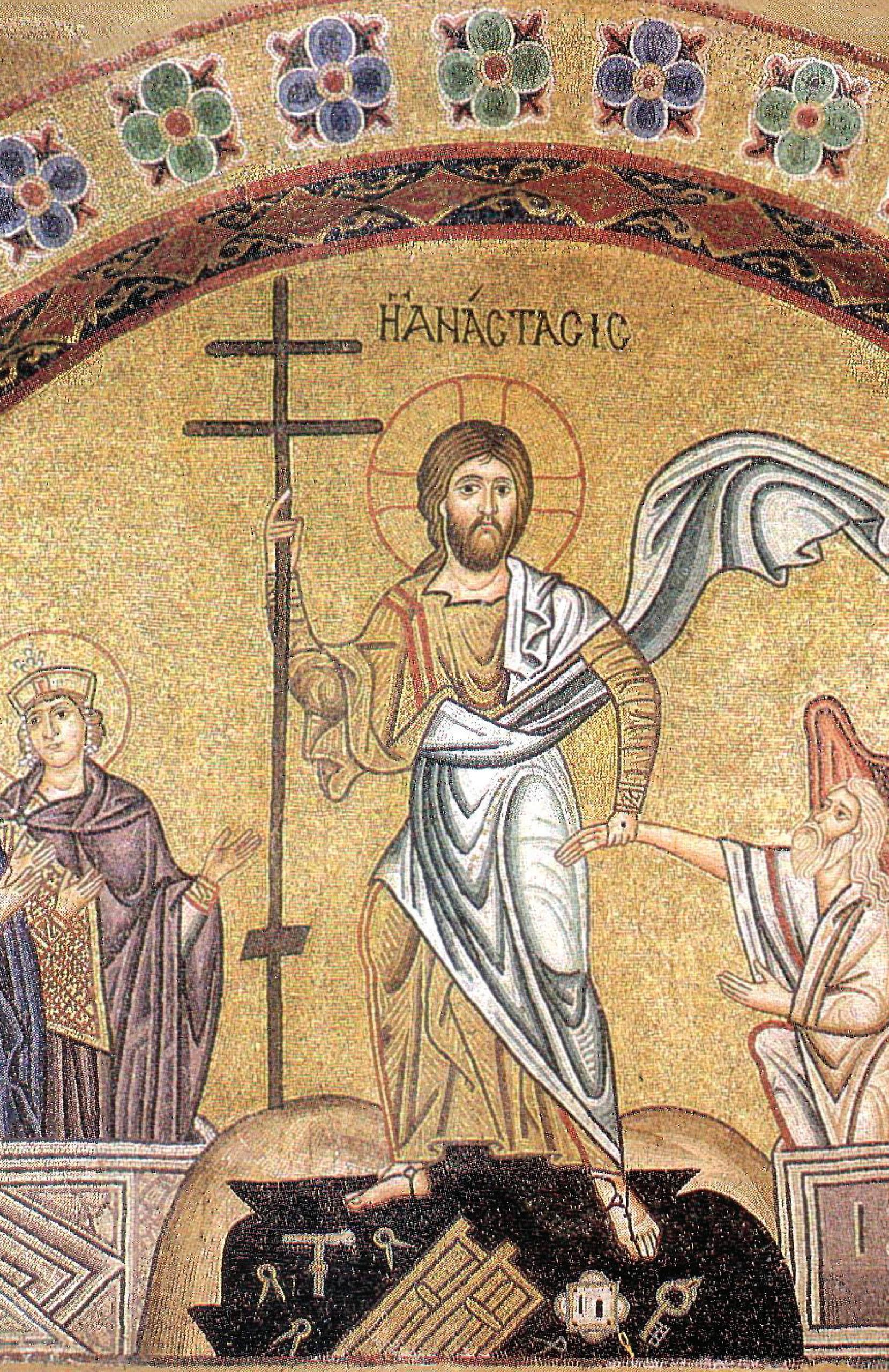 The Harrowing of Hell Hosios Loukas Monastery, Distomo, Greece
The Harrowing of Hell Hosios Loukas Monastery, Distomo, Greece
Come, ye faithful, raise the strain of triumphant gladness! God has brought his Israel into joy from sadness.
—John of Damascus (c. 675–754), translated by John Mason Neale (1818–1866)
monday, EastEr w EEk
by Jennifer Woodruff Tait
The competition for my favorite Easter hymn is steep, but this is at or near the very top. John of Damascus, who originally wrote its lyrics in Greek, was among the most famous of Eastern Christian saints. His text connects Christ’s Resurrection to the Old Testament story of the Exodus, to the yearly coming of spring, and to the expectant waiting of the disciples—concluding that “Neither could the gates of death, nor the tomb’s dark portal, / nor the watchers nor the seal hold him as a mortal.”
As I was first being drawn toward Anglicanism about 20 years ago, I attended an Easter Vigil service at our church in New Jersey. The Vigil traditionally begins fairly late at night and can take several hours. We had lit the “new fire” and proclaimed the light of Christ, we had heard the rehearsal of salvation history in numerous readings from the Old Testament while sitting
in a sanctuary lit only by candlelight, and then at long last, we had erupted with great joy into the “Gloria in excelsis deo.”
As the organ—silent since Maundy Thursday—thundered, the lights came on at full blast to reveal a church blazing with flowers; the choir, in our best vestments, streamed into the choir loft. It was well after midnight, and we entered to this hymn. A dear saint from the church, who had sung in the choir, had recently died. I looked across the choir loft to her empty place as I took up the opening lines of “Come Ye Faithful, Raise the Strain.”
There are moments that reach deeper than any words can say. If we truly confront what the Resurrection of Christ means, it will touch us in that place beyond words and beyond sorrow where there is only awe. The Lord is risen; he is risen indeed. v
 [Lig H t s H ining from cave]—p H oto by b runo van der k raan on u nsp L as H
[Lig H t s H ining from cave]—p H oto by b runo van der k raan on u nsp L as H
We, little fishes, after the image of our Ichthys, Jesus Christ, are born in the water.
Tertullian (c. 155–c. 220), On Baptism
tuE sday, EastEr w EEk
by Kaylena Radcliff
In those early days of Christianity, when believers suffered persecution, it is believed they identified one another by the “sign of the fish.” You may be familiar with the symbol— although today, instead of as a marker of safe gathering places for Christians, you’ve probably seen it as a decal on someone’s car. And maybe others have asked you: what in the world do fish have to do with Jesus?
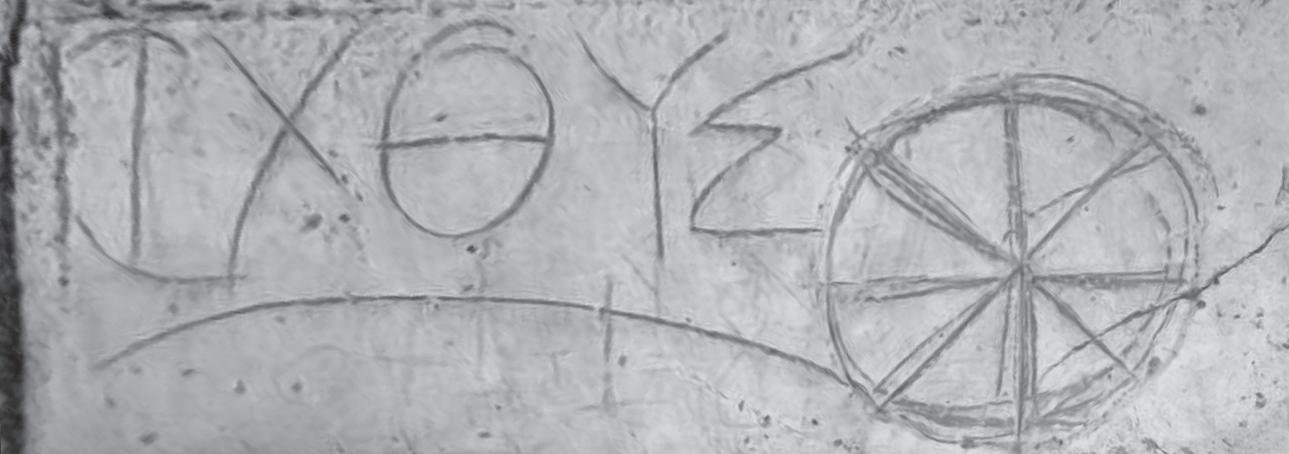
The word Ichthys—“fish” in Koine Greek—doubled as an acrostic with the letters standing for Iēsoûs Khrīstós, Theoû Huiós, Sōtér; or in English: “Jesus Christ, Son of God, Savior.”
Tertullian seems to play on this simple, clever creed of early believers in his quotation.
When we, little reflections of our Savior, obey his command to be baptized in his name, we picture our belief, rebirth, and identification with our Ichthys and confess the truth of who he is.
My church tradition baptizes professing believers through full immersion, and I’m fond of how this mode pictures what Romans 6 describes. The believer goes down in the water buried with Jesus in his death and then emerges, raised with Jesus by the glory of the Father to walk in the newness of life. While we could argue about modes of baptism until the Lord returns, we can certainly agree about its significance to our identity. In the water, we little fishes attest: Jesus Christ, Son of God, Savior. Amen! v
e ar L y cH ristian “ ΙΧΘΥΣ ” carved into marb L e in t H e ruins at e p H esus— m
/[ gnu f ree d ocumentation License] w ikimedia
ufunyo
Now the green blade riseth, from the buried grain, Wheat that in dark earth many days has lain; Love lives again, that with the dead has been: Love is come again like wheat that springeth green.
 —John
—John
Macleod Campbell Crum (1872–1958)
wEdnE sday, EastEr w EEk
by Jennifer Woodruff Tait
One night, shortly into our first pandemic Easter season in April, 2020, my then-seven-year-old daughter asked me to sing her an “Easter song” when I put her to sleep.
“Most Easter songs are pretty peppy,” I said. “I don’t think they would put you to sleep.”
“Are there any quiet Easter songs?” she asked.
“Well, there’s ‘Now the Green Blade Riseth,’” I said. And I sang it for her.
It’s now become one of “our” songs and a frequent lullaby request. It’s a rather unique Easter hymn—far more contemplative than majestic. When the Oxford Book of Carols was being compiled in 1928, the editors wanted an English-language text that could be sung
to a haunting medieval French Christmas carol tune called Noël Nouvelet. J. M. C. Crum, who provided the needed hymn text, was by all accounts a dedicated Church of England priest; while he wrote a few devotional books, this is by far his most famous composition. Somehow, the haunting melody and careful attention to those devastating three days when Jesus was “with the dead” made this song a consoling choice for a pandemic Easter. In the final verse, Crum reminds us that when we are “wintry, grieving, or in pain,” Jesus can recall us to life. If grief or tragedy or loneliness has transcribed your Easter into a minor key, seek comfort from the Lord who knew death and brought life. v
[ s eed L ings]—p H oto by r ac H e L r ein H ardt on u nsp L as H
Because Christ humbled Himself even to the death of the Cross, from love and obedience to God, it behooved Him to be uplifted by God to a glorious resurrection.
—Thomas Aquinas (1225–1274), Summa Theologiae III.53
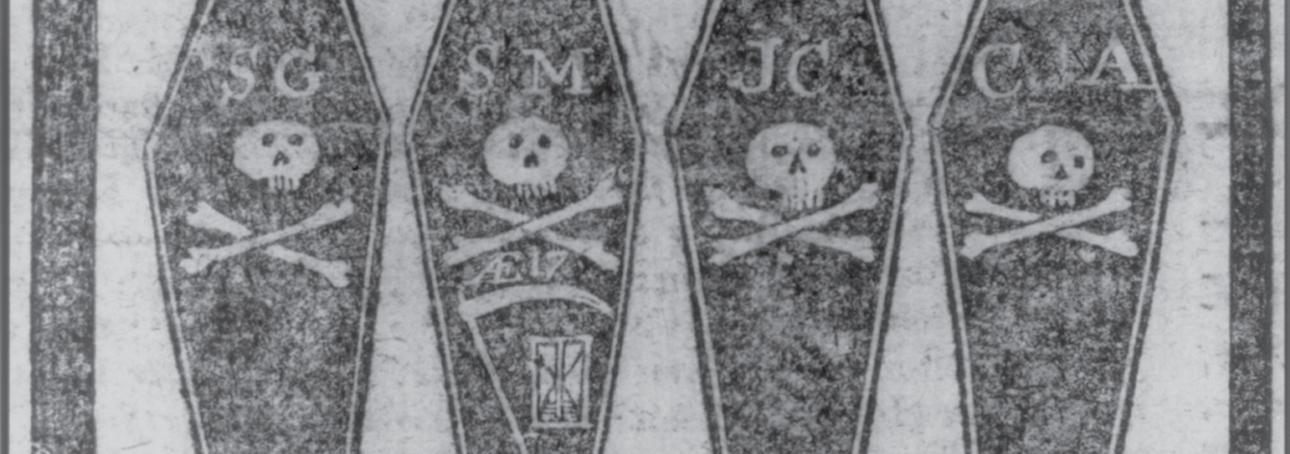
thursday, EastEr w EEk
by Dawn Moore
On a cold January evening in 2018, I entered an old funeral parlor on South Broad Street in Philadelphia. This was not just any funeral parlor, but one that once acted as a well-known front for the Philadelphia mob and a notorious drug house. So, besides performing services for the deceased, this decrepit place contributed to the hatred, violence, and general malaise of the city. In every way imaginable, it was a house of death, covered in a shroud of darkness.
But there I was, eagerly entering the front door in anticipation of a spiritually rich and casserole-filled evening. You see, this bit of blight has undergone a radical transformation . . . a sort of resurrection! It is the newest location of Circle of Hope Church, a missional body seeking to “create an environment
where people can connect with God and act for redemption.”
Where mob bosses and drug dealers once reigned, a church has been born. Where the neighbors once feared to tread, the doors have been opened wide. As a guest that evening, I enjoyed a vibrant time of worship followed by a tasty meal with new friends. The cheerful wildflowers tied with colorful ribbons onto columns all around the room seemed to perfectly represent the new life that spilled from this reborn building out into the community.
As we enter the coming weeks of Easter, take time to notice signs of resurrection hope in your own community. If you have trouble finding them, ask God to show you ways you might bring a fresh wind of the Spirit to your neighborhood. v
p au L r evere ( 1735 –1818 ), [ f our coffins of men ki LL ed in t H e b oston massacre]—Library of c ongress
What had become of the Redemption of the whole Body of Mankind, if they had not cause to believe the Message that the Lord Jesus sent by these Women, of and concerning his Resurrection?
—Margaret Fell (1614–1702), Women’s Speaking Justified, Proved, and Allowed by the Scriptures
Friday, EastEr w EEk
by Michelle Curtis
The Resurrection is one of my favorite stories in the whole Bible. Not only is Jesus’s Resurrection from the dead at the crux of our whole faith, but God entrusts this good news to a handful of women. The good news of the Resurrection doesn’t first come to the king or the governor or the priest or even to Peter. It’s a humble group of women, who had come to the tomb in their grief to care for Jesus’s dead body, who first learn what’s happened. They’re just doing what women have done for centuries—the hard and holy work of quietly caring for loved ones behind the scenes. And there the angel entrusts them with a most important message of redemption.
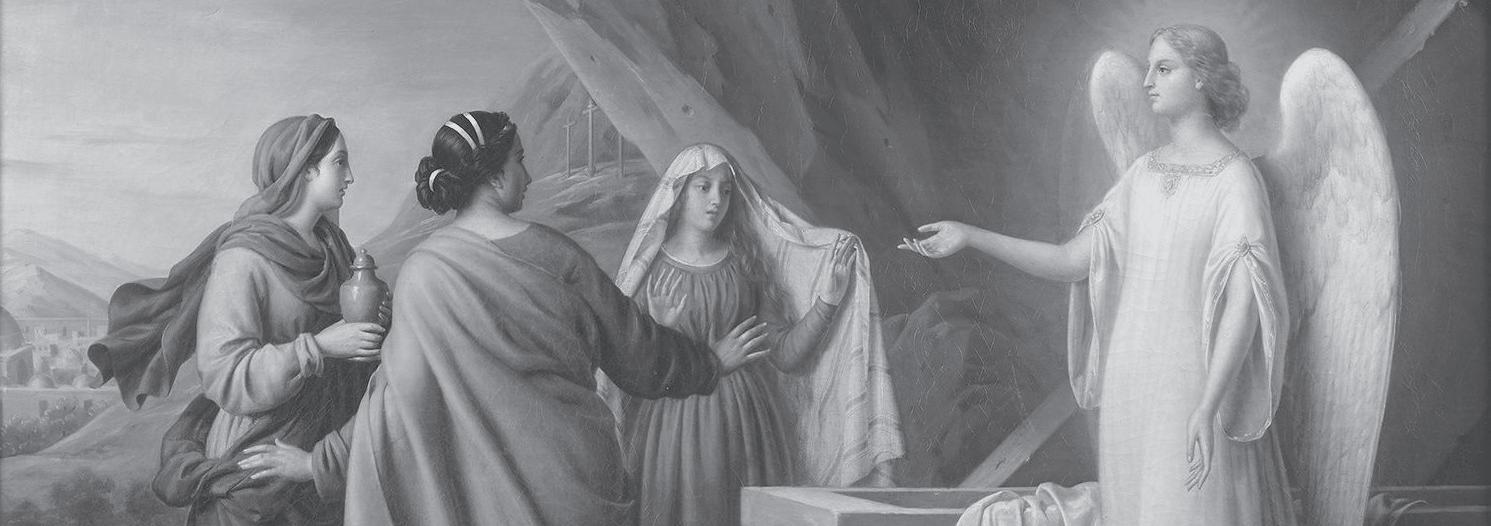
If it’s surprising today, it would have been shocking in the first century. How could a few women be the first to hear and proclaim the good news of
the Resurrection? Surely they hadn’t understood what the angel meant. As Luke tells the story, Jesus’s disciples did not believe the women. Not at first anyway. “It seemed to them an idle tale,” Luke reported. But the women knew what they had seen and heard. And eventually the men would believe too.
In my own life, this story has been good news to me as I’ve embraced God’s call to become a pastor and preacher—to speak the good news of Jesus’s Resurrection as a woman. If you’ve ever felt like God couldn’t possibly choose you for whatever reason, how might this story be good news to you? And if you’ve never questioned that God can and does call you, who else is speaking good news that you might need to listen to, especially if they seem like the “wrong person” for God to choose? v
i rma m artin ( 1814 –1876 ), T H e TH ree women on TH e T omb of C H ris T ( 1843 )— i nva L uab L e / pub L ic domain, w ikimedia
Even on the cross He did not hide Himself from sight; rather, He made all creation witness to the presence of its Maker. Then, having once let it be seen that it was truly dead, He did not allow that temple of His body to linger long, but forthwith on the third day raised it up, impassable and incorruptible, the pledge and token of His victory.
Athanasius (c. 296–373), On the Incarnation

saturday, EastEr w EEk
by Kaylena Radcliff
The miracle of the Resurrection looms large in humanity’s collective consciousness. From best-selling books to the silver screen, we cannot get enough of resurrection stories. We cheer when the hero, fallen in that most final defeat, rises whole and triumphant over death. And it’s not just a modern phenomenon. Go back to the oldest civilizations on Earth, and see it written across their mythologies. Our fascination displays our hearts. Deep down we recognize our dying state for what it truly is: a curse in desperate need of breaking.
Even so, ostensibly missing from many of those same narratives are a satisfying how and why. We recognize the curse and our fate because of it, but what can reverse it? Who can deliver us from our bodies of death?
Thanks be to God through Jesus Christ our Lord! We find our answer in him. This beautiful truth, fleshed out in Romans and commented on here by Athanasius, shows that our Maker who gave life to the universe was really, undeniably dead. But the grave could not hold him. He rose again, perfect and incorruptible, triumphant over sin and death for eternity.
Christian, remember today that the Resurrection story is your story. God’s triumph and miracle are gifts to you. “For God so loved the world, that he gave his only begotten son, that whoever believes in Him will not perish but have eternal life” (John 3:16).
Wherever you find yourself in the race, remember it has already been won. His victory is yours, and it’s yours forever. v
Jo H n b aker, r esurre CT ion of Jesus C H ris T (c. 1835 )—Library of c ongress
Meet the teaM: CONtRIBUtORS tO thIS ChI DeVOtIONal
v Chris R. Armstrong is an educator, author, editor, and church historian who serves as Program Fellow in Faith, Work, and Economics for the Kern Family Foundation (Wisconsin) and as senior editor of Christian History.
v Bill Curtis is executive editor and president of Christian History Institute.
v Michelle Curtis was a contributing editor at Christian History until the birth of her son in September 2022; she is copastor of Ambler Mennonite Church.
v Dan Graves is an admirer of the faithful Christians who preceded us, layout editor of Christian History, and husband, father, and author of several books, including Scientists of Faith, The Heidelberg Catechism for Sunday Schools, and A Severe Paradise.
v Doug Johnson is the indefatigable art director for Christian History.
v Kellie Mitchell, previously a CHI intern, recently completed her bachelor of arts in anthropology from Wheaton College; she is currently coleading a study abroad program in Jerusalem and pursuing a career in journalism.
v Dawn Moore is retired from Christian History’s editorial staff and now focuses on running a new Airbnb; exploring Lancaster, Pennsylvania; and caring for various family members.
v Meg Moss is a freelance editor and writer who serves as proofreader of Christian History.
v Max Pointner is the image researcher for Christian History and a core teacher and administrator at Charis Classical Academy in Madison, Wisconsin, where he and his wife, Madeleine, are raising their newborn daughter.
v Kaylena Radcliff is director of Christian History’s editorial staff, author, wife of a church planter, and mother of two.
v Edwin Woodruff Tait is a contributing editor at Christian History; he blogs at Light in the West at Patheos Catholic and is the organist for St. Clare Catholic Church in Berea, Kentucky. He and Jennifer have two children.
v Jennifer Woodruff Tait is the managing editor of Christian History magazine, the author of The Poisoned Chalice and Christian History in Seven Sentences, and an Episcopal priest.

A Spiritual Pilgrimage Through lent Walk Through TheWilderness


Walk with Jesus this Lent through this collection of reflections written by the Christian History Institute team, based on Scripture selections chosen from the Revised Common Lectionary and quotes from the writings of great Christians of the past. Ponder anew Christ’s life, death and resurrection, and be led by your brothers and sisters in Christ throughout church history as you contemplate our need for redemption and His gracious gift.





 Cross = Love, Vaishakh Pillai
Cross = Love, Vaishakh Pillai

 Votive candles, Gloucestershire, UK
Votive candles, Gloucestershire, UK

 Still life with crucifix, Gini_Geo Photography
Still life with crucifix, Gini_Geo Photography

 Ceremony of Ash Wednesday , Missal of Eberhard von Greiffenklau
Ceremony of Ash Wednesday , Missal of Eberhard von Greiffenklau
 temptations of Christ (mosaic in basilica di s an m arco)— a nonymous / public domain, Wikimedia
temptations of Christ (mosaic in basilica di s an m arco)— a nonymous / public domain, Wikimedia
 Temptation of Christ , twelfth-c. mosaic, St Mark’s Basilica, Venice, Italy
Temptation of Christ , twelfth-c. mosaic, St Mark’s Basilica, Venice, Italy





 by Kellie Mitchell
by Kellie Mitchell

 First Presbyterian Church, Virginia City, Nevada
First Presbyterian Church, Virginia City, Nevada


 by Michelle Curtis
by Michelle Curtis




 Blue Church, Seyðisfjörður, Iceland
Blue Church, Seyðisfjörður, Iceland

 by Kaylena Radcliff
by Kaylena Radcliff





 Christ the Good Shepherd, Daryl C (incarcerated artist), 2011
Christ the Good Shepherd, Daryl C (incarcerated artist), 2011







 Mishi Spring, Sisakht, Iran, by Milad Gerami
Mishi Spring, Sisakht, Iran, by Milad Gerami
 t o Sinai BY C ar. a in g edeirat— aM eri C an Colon Y (Jeru S ale M ). p hoto d epart M ent, photographer. l i B rar Y of Congre SS
t o Sinai BY C ar. a in g edeirat— aM eri C an Colon Y (Jeru S ale M ). p hoto d epart M ent, photographer. l i B rar Y of Congre SS






 Palm Sunday in Spain, Jean-Georges Vibert
Palm Sunday in Spain, Jean-Georges Vibert
 Croix du n i V o L et s a V oie, f ran C e—Photo by a drien oL i C hon on u ns PL ash
monday in Holy Week
Croix du n i V o L et s a V oie, f ran C e—Photo by a drien oL i C hon on u ns PL ash
monday in Holy Week
 Croix du Nivolet Savoie, France
Croix du Nivolet Savoie, France

 Diptych with Mary and Her Son Flanked by Archangels, Apostles and a Saint, Fre Seyon
Diptych with Mary and Her Son Flanked by Archangels, Apostles and a Saint, Fre Seyon

 Orthodox church, Bulgaria
Orthodox church, Bulgaria

 Institution of the Eucharist Mosaic, St. James Church, Medjugorje, Bosnia and Herzegovina
Institution of the Eucharist Mosaic, St. James Church, Medjugorje, Bosnia and Herzegovina

 Blessed Sacrament Church, Itajaí, Brazil
Blessed Sacrament Church, Itajaí, Brazil

 Kinver Edge, Kinver, England
Kinver Edge, Kinver, England
 Hosios Loukas, Harrowing of Hell —anonimus / pub L ic domain, wikimedia
Hosios Loukas, Harrowing of Hell —anonimus / pub L ic domain, wikimedia
 The Harrowing of Hell Hosios Loukas Monastery, Distomo, Greece
The Harrowing of Hell Hosios Loukas Monastery, Distomo, Greece
 [Lig H t s H ining from cave]—p H oto by b runo van der k raan on u nsp L as H
[Lig H t s H ining from cave]—p H oto by b runo van der k raan on u nsp L as H

 —John
—John







